This first Part One of my annual favorite book awards is long… you may have to scroll down in your device to read it all and to see the order link at the very bottom. Thanks for pursuing this. We are immensely grateful for your interest and support.
 Between stupid winter illnesses and out-of-store events and brand new or forthcoming books to read, our annual custom of announcing our Hearts & Minds Best Books of the Year has been late in coming. 2019 was a good one for readers of all sorts (even if nation-wide book sales were down) and I’m eager to honorably mention as many great titles as I can in this ramble through the halls of memorable reads.
Between stupid winter illnesses and out-of-store events and brand new or forthcoming books to read, our annual custom of announcing our Hearts & Minds Best Books of the Year has been late in coming. 2019 was a good one for readers of all sorts (even if nation-wide book sales were down) and I’m eager to honorably mention as many great titles as I can in this ramble through the halls of memorable reads.
It’s going to take me a few parts, so here is PART ONE, at least. It’s long, so be sure to hang in there until the bottom, a few yards down from here.
Most years I keep up the playful façade that these are Real Awards, but let’s face it. Not that many really care what this wordy bookseller from a small-town, family-owned business thinks and we offer no cash prizes. So let’s just say this: for our faithful tribe of customers who send us orders we are glad for your eagerness to hear our favs. A few regulars have told us they’ve been waiting; thanks for that. It’s hard, though, you know: I’ve had so many blessed hours with my nose in a book (as has Beth and the rest of our staff) that is hard remembering them all. Come on along, though, and I’ll share some of our favorites from that year of our Lord, 2019.
ALL BOOKS NAMED ARE ON SALE FOR 20% OFF. PLEASE USE THE SECURE ORDER FORM LINK AT THE END OF THIS COLUMN.
Okay, we’re going to start off strong with a fun and notable one. Happily, this has become our best seller of 2019, even though we received in only a few weeks before Christmas.
THE BOOK THAT MADE ME HAPPIEST TO SELL THIS YEAR: ONE OF THE BEST OF 2019 and SURELY OF 2020
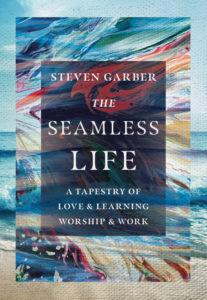 The Seamless Life: A Tapestry of Love & Learning, Worship & Work Steve Garber (IVP) $20.00 It is hard to declare decisively what my one favorite book was this year, but Garber’s A Seamless Life is up there, certainly among the top few. I read it twice, at least, and savored every page. The smallish, compact size and the textured paper and the vivid color photos makes me glad, the exquisite writing and the honest, sensible, yet radically integrated faith captures so much of my own heart. Is it fair to celebrate this as the Book of the Year if Steve is such a dear friend? I try to sort out if others will love it as I do if they don’t know Steve and Meg personally. I think so.
The Seamless Life: A Tapestry of Love & Learning, Worship & Work Steve Garber (IVP) $20.00 It is hard to declare decisively what my one favorite book was this year, but Garber’s A Seamless Life is up there, certainly among the top few. I read it twice, at least, and savored every page. The smallish, compact size and the textured paper and the vivid color photos makes me glad, the exquisite writing and the honest, sensible, yet radically integrated faith captures so much of my own heart. Is it fair to celebrate this as the Book of the Year if Steve is such a dear friend? I try to sort out if others will love it as I do if they don’t know Steve and Meg personally. I think so.
Certainly, this is a truly wonderful release and it is being taken seriously by good folks. (The endorsements on the back and inside cover are breathtakingly good, from advanced readers all over the globe.) We’ve gotten re-orders on it, which is always a good sign, that it is finding its readers and that others are longing for this sense of integration, a seamless life, a connection between work and worship, between Word and world. If you like Hearts & Minds, if you value BookNotes, I can say surely that you should order this book.
As I said in my big review HERE (please visit and read my comments it if you haven’t) these chapters in A Seamless Life are literally reports from the road, insights into Steve’s life and teaching and travels and observations written out from along the way. He brings so much good context to his stories (whether it is a reflection on his rancher grandfather or a film review or a story from his beloved Pittsburgh or a telling about a workplace he visited where healthy, faithful efforts were being made for the common good.) He finds much to celebrate, even as his heart is heavy with the brokenness of the world, and he affirms such goodness and beauty. There is a coherence to all of this, really, a seamlessness that the reader is drawn in to as these short essays gel into a big picture of a life well lived.
Here is just a bit of what I said when I was enticing folks to pre-order it from us here at Hearts & Minds:
Steve’s a born storyteller; he loves to hold up the work and witness of others to help us all be inspired to live more creatively and faithfully in-but-not-of this broken, broken, already-but-not-yet world. Yet, still, the movies and stories and exemplars in his other bigger books are arranged to illustrate the big points of the book, so, interesting as they are, they are mostly connected to that particular theme and illustrative. In The Seamless Life, however, Garber covers more topics which allows him to introduce to us even more of his friends, his favorite writers, his discoveries about family and friendship and church and business and more. The stories are front and center. In a way, these pieces are just more of the same we’ve come to expect from Steve but the scope is a bit more broad, and the short form allows him to dip in to this topic or that, tell this episode or quote that lyric or explain that movie with even more personality and obvious wisdom. It makes for very inspiring and interesting and energetic reading, urgent reports from the road. I don’t want to overstate this, but it is almost devotional, doxological.
FAVORITE BOOKS FOR CHURCHES AND PASTORS
There are dozens of books that come out every month about congregational life, pastoral ministry, denominational vibrancy, worship, renewal, missional vision, outreach, education, leadership, and more. 2019 has seen plenty of good ones and when we are at pastor’s 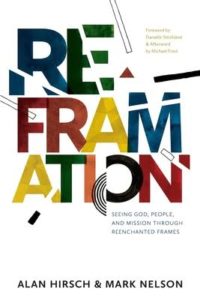
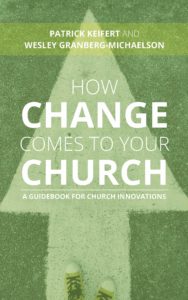 retreats or conferences we highlight many of these. From really helpful, practical guides like How Change Comes to Your Church: A Guidebook for Church Innovations by churchy geniuses Patrick Keifert & Wes Granberg-Michaelson (Eerdmans; $16.99) to the great Peter Steinke’s Uproar: Calm Leadership in Anxious Times (Rowman & Littlefield; $19.95) to the edgy and rare work by missional wild guys Alan Hirsch and Mark Nelson released this year called Reframation: Seeing God, People, and Mission Through Reenchanted Frames (100 Movements Publishing; $19.99) there has been a richness of new thinking and important publishing. I could list many that are worth honoring, but besides these, we wanted to mention these five exceptional ones at least:
retreats or conferences we highlight many of these. From really helpful, practical guides like How Change Comes to Your Church: A Guidebook for Church Innovations by churchy geniuses Patrick Keifert & Wes Granberg-Michaelson (Eerdmans; $16.99) to the great Peter Steinke’s Uproar: Calm Leadership in Anxious Times (Rowman & Littlefield; $19.95) to the edgy and rare work by missional wild guys Alan Hirsch and Mark Nelson released this year called Reframation: Seeing God, People, and Mission Through Reenchanted Frames (100 Movements Publishing; $19.99) there has been a richness of new thinking and important publishing. I could list many that are worth honoring, but besides these, we wanted to mention these five exceptional ones at least:
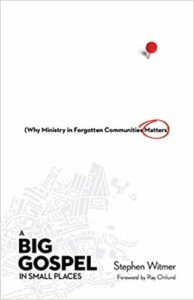 A Big Gospel in Small Places: Why Ministry in Forgotten Communities Matters Stephen Witmer (IVP/Praxis) $18.00 I am always on the look-out for books about smaller churches since, frankly, most congregations are not mega-churches and most are in smaller towns and are fairly, well, ordinary. Rural and rustbelt places without a lot of potential for growth, towns with “brain drain” and not many jobs for younger adults, you know. Sometimes we feel like we are in “forgotten places” and, in this book, Stephen Witmer cares. Not everybody may need this book, but for many small town clergy, this will be a huge inspiration. For most serving in rural and out of the way places, this will be a tonic. For those in these places, it may be obvious that God is with you but having a vibrant, thoughtful pastor remind you and further equip you may be just what you need.
A Big Gospel in Small Places: Why Ministry in Forgotten Communities Matters Stephen Witmer (IVP/Praxis) $18.00 I am always on the look-out for books about smaller churches since, frankly, most congregations are not mega-churches and most are in smaller towns and are fairly, well, ordinary. Rural and rustbelt places without a lot of potential for growth, towns with “brain drain” and not many jobs for younger adults, you know. Sometimes we feel like we are in “forgotten places” and, in this book, Stephen Witmer cares. Not everybody may need this book, but for many small town clergy, this will be a huge inspiration. For most serving in rural and out of the way places, this will be a tonic. For those in these places, it may be obvious that God is with you but having a vibrant, thoughtful pastor remind you and further equip you may be just what you need.
There are a few things that make this book important. Firstly it is about what our culture deems insignificant places. Small towns and out of the way spots don’t have the sexy appeal of urban locations, and their problems are sometimes seen as less dramatic (even if no less painful) We’ve heard mission speakers and authors talk about extraordinary inner city work, about being peacemakers among rival urban gangs, or much needed, edgy racial reconciliation campaigns. We’ve heard about faith and work initiatives and big university outreaches – all strategic and exciting, even among the prestigious and powerful. That kind of drama and potential may not be prevalent in small places, and when we make a big deal out of big city work, we some how overlook those who live in more mundane contexts. How do we think big about small places? How can we resist the “Go Big or Go Home” mentality in our culture?
And that is another thing about A Big Gospel in Small Places: it does help us think about a sense of place. One chapter is called “Why Small Places are Better Than We Think” and another is “Why Small Places are Worse Than We Think.” Witmer neither demonizes nor idolizes but offers a fresh look, offering some intellectual insights to frame our work in out of the way places.
The middle, major part of the book has six chapters about how we can minister fruitfully in smaller places. That is, it develops a theological vision for small-place ministry. It is gospel-centered and offers a robust, orthodox view of how the gospel can be transformational, even amidst what he calls “joy killers in small-place ministry.”
The last three chapters are splendid for pastors or leaders wanting to be intentional and discerning about their calling to small places. He offers “Good and Bad Reasons to Do Small Place Ministries” and “Good and Bad Reasons Not to Do Small Place Ministries” and “Common Responses to Prioritize Big-Place Ministry.” This should be read by mission boards, denominational execs, moderators and Bishops and conference ministers and regional superintendents. It’s useful for those used to strategizing and thinking big, and it is useful for those who don’t really strategize much at all, like many mid-level judicatory folks already juggling so many balls in the air. I think this stuff will be useful, if not perfect, for many, many folks in church leadership these days.
Listen to Echard Schnabel, Distinguished New Testament professor at Gordon Conwell; I quote it because it is so good and right. Consider this:
This is one of the more important books written about the gospel and missions in recent decades. Stephen Witmer takes the gospel seriously: he is more interested in the good news than in church-planting strategies. He takes people seriously: he is more concerned for people than for programs. He understands success in terms of faithfulness to God’s calling rather than in terms of fame, in terms of the transformation of people’s lives rather than in terms of the numerical size of a congregation.
Here writes an academic who wears his scholarship lightly, a pastor who challenges his audience to think deeply, a follower of Jesus who follows Jesus to all the places where people live. Witmer explains that strategic thinking about ministry must acknowledge one of the great truths about God who lavishes his grace on city people, on small-town people, and on village people alike. This book is a pleasure to read, indeed a must-read for professors, students, and pastors who think about gospel ministry in the twenty-first century.
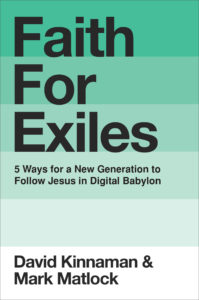 Faith for Exiles: 5 Ways for a New Generation to Follow Jesus in Digital Babylon David Kinnaman & Mark Matlock (Baker) $21.99 This is for anyone who is interested in retaining the young adults at their church – and who isn’t? – and is an exceptionally interesting, clear, and helpful resource. It offers an overview of the extensive research and evaluation Kinnaman’s organization (The Barna Group) has done on what keeps young adults from saying “you lost me” (as in Kinnaman’s 2011 must-read book that explored what goes wrong in young adult ministry, You Lost Me.) This new one shows what we might do right – five things needed to keep younger folks vibrant in faith and interested in your church.
Faith for Exiles: 5 Ways for a New Generation to Follow Jesus in Digital Babylon David Kinnaman & Mark Matlock (Baker) $21.99 This is for anyone who is interested in retaining the young adults at their church – and who isn’t? – and is an exceptionally interesting, clear, and helpful resource. It offers an overview of the extensive research and evaluation Kinnaman’s organization (The Barna Group) has done on what keeps young adults from saying “you lost me” (as in Kinnaman’s 2011 must-read book that explored what goes wrong in young adult ministry, You Lost Me.) This new one shows what we might do right – five things needed to keep younger folks vibrant in faith and interested in your church.
I know there are more philosophically dense and theologically mature studies of this vexing topic. But none are as interesting and action-able and useful as this. It is simply a must-read, one of the most important congregational books of the year!
Here is some of what I wrote about this at BookNotes before. It was in a Labor Day column, I think, about books about faith and work, so I highlighted that particular aspect (one of the five practices explored) of Faith for Exiles. That it mentions us is just extra special, but, sincerely, that’s not why I celebrate and honor it here as one of the best books for church use this year.
After a little reminder that we had been taking pre-orders, and a Labor day wish for prayers for our package handlers and mail delivery folks who get books to us, and then you, I wrote:
As I explained in those previous BookNotes comments, this book reports on the latest Barna-based research on the sorts of practices and theological visions offered by churches that tend to keep and attract twenty-somethings. In a way, Kinnaman has done two previous books on stuff churches do wrong, attitudes and churchy habits that tend to discourage the emerging adults in their midst. This new one describes what works. In the “starred review” by Publishers Weekly it says it is a “wonderful, thoughtful book that conveys difficult truths in a spirit of humility.” They suggest, if widely read, it could influence the church for years to come.
Here is why I mention this now in the special Labor day issue of BookNotes: one of the five key practices that churches that maintain their relationship with their young adults and attract that age group is “To ground and motivate an ambitious generation, train for vocational discipleship.”
Did you get that? We must Train. For. Vocational. Discipleship.
This chapter — which, okay, I’ll admit I’m proud about, since it mentions the Jubilee conference and calls Beth and me “booksellers par excellence” — highlights the data that shows that a younger generation “gets” this vision of whole-life discipleship and longs for meaningful labor. They have grown up hearing about making a difference, about paying it forward, with work-world heroes like the founder of Tom’s Shoes. The book has some fascinating data about what millennials think of work (around their claim that God calls us to work in order to create abundance, order, and beauty.) Younger adults these days are ambitious and want to shine and we in the church simply have to connect this unique generational vision and energy with Biblical foundations and Christian theology and a robust perspective on work, vocation, and calling. We in the established churches have older work-world leaders that could mentor these younger ones in “vocational discipleship” (and Matlock and Kinnaman explain how) but, to be honest, perhaps some of the older ones might have to learn from some of the younger ones. I sometimes tell eager 21year-olds at Jubilee that they now, having heard what they’ve heard there and having read a book or two that they bought, may know more about this all-of-life-redeemed, vocational, Sunday/Monday work-world ministry stuff than their home pastors and parents and beloved youth ministers. Maybe we in the church need these kids as much as they need us.
In any event, that the Barna research group and Kinnaman & Matlock have identified this as one of the key practices that is necessary for effective shaping of those in this new generation in “digital Babylon” is significant. And, after all, aren’t we all in that same boat? We all need to hear this stuff. I highly recommend Faith for Exiles, and, certainly, that chapter on vocationally oriented discipleship.
I honor this as a notable book this year for another reason. Not only is it essential for anyone wanting to work with young adults or keep younger adults in their congregations, I think it is good for those who work with youth. Further, it is a book you can put into the hands of college-age or twenty-somethings; it will impress them, I am sure, help them, and, at the very least, you can ask if it resonates, if this sort of stuff would help them understand God’s purposes for their lives and help them realize their own need for the gospel, the church, and what Garber calls a “seamless life.” Faith for Exiles is relevant for those living in the i-Gen world of “Digital Babylon” and we commend it, urgently.
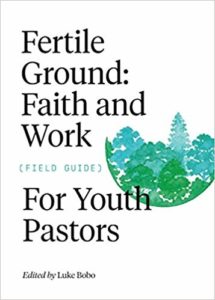 Fertile Ground: Faith and Work (Field Guide) for Youth Pastors edited by Luke Bobo (Made To Flourish) $7.99 This very small book is handsome and nicely made, a collection of five key chapters that help youth workers develop among their kids a robust and faithful foundation for thinking Christianly about culture, calling, work, and careers. We have written plenty about this topic in these BookNotes columns and have offered dozens if not hundreds of titles over the years that call us to deepen our appreciation of the value of work and to nurture a distinctively Biblical vision of both our perspective on and practices within our job sites. There has been precious few resources to wisely help youth take up this vision and hardly anything of book length to equip youth workers to talk to teens about all this,
Fertile Ground: Faith and Work (Field Guide) for Youth Pastors edited by Luke Bobo (Made To Flourish) $7.99 This very small book is handsome and nicely made, a collection of five key chapters that help youth workers develop among their kids a robust and faithful foundation for thinking Christianly about culture, calling, work, and careers. We have written plenty about this topic in these BookNotes columns and have offered dozens if not hundreds of titles over the years that call us to deepen our appreciation of the value of work and to nurture a distinctively Biblical vision of both our perspective on and practices within our job sites. There has been precious few resources to wisely help youth take up this vision and hardly anything of book length to equip youth workers to talk to teens about all this,
Luke Bobo is developing curriculum and resources through the wonderful Made to Flourish network, an organization founded by Tom Nelson, author of Work Matters: Connecting Sunday Worship to Monday Work and The Economics of Neighborly Love: Investing in Your Community’s Compassion and Capacity. This is foundational stuff, drawing on Nelson and broader worldview writers (Al Wolters, Richard Mouw, James K.A. Smith) helping youth workers develop a cultural theology, create formative liturgical practices to shape young imaginations, and offering a integrated vision of the meaning of labor, the discernment of call, and the vision of social transformation. Think of the thoughtful book The Call by Os Guiness or the moving work of Steve Garber, say, appropriated for youth pastors. Think of the solid stuff of Amy Sherman (such as her must-read Kingdom Callings) or the nice Bible study by Bob Robinson, Reintegrate Your Vocation with God’s Mission made plain for teens. This is the overall vision and deep connection to the faith-and-work movement Luke Bobo has; Made to Flourish is to be honored and celebrated for offering their many services, and this kind of much-needed resource, specifically. What a substantive and thoughtful (and really handsomely designed) little book. A truly notable book of 2019!
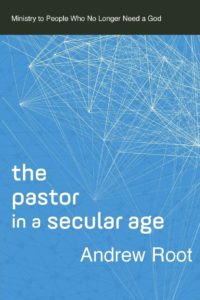 The Pastor in a Secular Age: Ministry to People Who No Longer Need a God Andrew Root (Baker Academic) $26.99 Oh man, oh man, this is surely one of the most interesting and notable books of the year! We’ve had great conversations with many customers (okay, maybe not many) who have found this to be an exceptional study, provocative and one that has created space for deep and valuable conversations. The idea of it is brilliant, and Andrew Root is an author we always, always, recommend (whether you end up agreeing with his conclusions or not.) He is a Professor of Youth and Family Ministry at Luther Seminary and is increasingly a very, very important thought leader. Happily, he seems to have the ear of both more conservative evangelicals and of mainline denominational folk. Just last week I highlighted it in a book talk with local friends from the United Church of Christ, encouraging pastors to work through it.
The Pastor in a Secular Age: Ministry to People Who No Longer Need a God Andrew Root (Baker Academic) $26.99 Oh man, oh man, this is surely one of the most interesting and notable books of the year! We’ve had great conversations with many customers (okay, maybe not many) who have found this to be an exceptional study, provocative and one that has created space for deep and valuable conversations. The idea of it is brilliant, and Andrew Root is an author we always, always, recommend (whether you end up agreeing with his conclusions or not.) He is a Professor of Youth and Family Ministry at Luther Seminary and is increasingly a very, very important thought leader. Happily, he seems to have the ear of both more conservative evangelicals and of mainline denominational folk. Just last week I highlighted it in a book talk with local friends from the United Church of Christ, encouraging pastors to work through it.
So what is this book about, really, and why is it deserving of a shout out here in our listing of best, favored, or most important reads of 2019? I’ll just say this: it comes on the heels of a previous much-discussed and awarded volume called Faith Formation in a Secular Age which came out in 2017. That book began a process of inquiry where (among other things) root explored the significance of Charles Taylor’s massive work The Secular Age for congregational 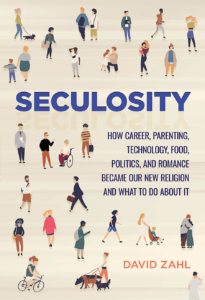 life. (I trust you know that many of our favorite books in recent years have been in conversation with Taylor’s hefty volume and considerable analysis: see, for instance, How (Not) To Be Secular: Reading Charles Taylor by James K.A. Smith, Disruptive Witness: Speaking Truth in a Distracted Age by Alan Nobel, In Search of the Common Good by Jake Meador, Seculosity: How Career, Parenting, Technology, Food, Politics, and Romance Became Our New Religion and What to Do about It by David Zahl, and Preaching: Communicating Faith in an Age of Skepticism which has an excellent chapter on Taylor.)
life. (I trust you know that many of our favorite books in recent years have been in conversation with Taylor’s hefty volume and considerable analysis: see, for instance, How (Not) To Be Secular: Reading Charles Taylor by James K.A. Smith, Disruptive Witness: Speaking Truth in a Distracted Age by Alan Nobel, In Search of the Common Good by Jake Meador, Seculosity: How Career, Parenting, Technology, Food, Politics, and Romance Became Our New Religion and What to Do about It by David Zahl, and Preaching: Communicating Faith in an Age of Skepticism which has an excellent chapter on Taylor.)
In any case, in Faith Formation in a Secular Age Root brings a remarkably fresh critique of youth ministry and our fascination (in this secular age) with youthfulness. What a remarkably generative bit of insight, plumbing how our culture and our churches have failed in thinking well about our generations (and about the crisis of young adults drifting from the faith.)
So, here, now, in The Pastor in a Secular Age Root continues to draw on his very interesting social analysis and Taylor-esque imagination about our culture and then asks what people are seeking in their religiosity these days. And then – and here it gets interesting – if that is part of what is going on, then what, then, is the role of the pastor?
The first section of this book – 8 serious chapters – is called “Welcome to the Pastoral Malaise” and he moves from Thomas Becket to Augustine to the history of great shifts in pastoral roles (Henry Ward Beecher and Harry Emerson Fosdick) and what happens when the search for purpose (a la Rick Warren) and authenticity “becomes king.” He uses the famous sociologist Durkheim to explore all of this… and it is fabulously interesting. I have told pastor groups that they really ought to be reading this and I am confident it is the most important book (at least in this genre of studying about the nature of pasturing in our social context) for clergy in quite a while.
Part 2 includes a lot of creatively construed Bible study and suggests that God is “a ministering pastor.” You will have to decide if this major work is useful in helping you re-imagine your role in more faithful and effective ways, but there it is. This is important stuff. I think it is good not only for pastors, but for anyone who is seriously involved in church, cares about religious leadership, and wants to pursuing faithfulness together with their congregational leaders.
Listen to these two astute blurbs and see why I’m insisting this is such a vital book to be reading:
Good books help you see what you couldn’t see before–like why pastoring is so difficult. Better books help you see the work of God despite the millennia of obstacles we have thrown up against divine agency. Root thinks the living God can break through our pastoral malaise. Reading him, I found myself not only agreeing but learning and delighting and looking anew for the God who pastors us all.”
— Jason Byassee, Vancouver School of Theology
“In a world longing for enchantment but too cynical to accept it, pastors can understandably feel irrelevant and confused. Root provides a helpful overview of how our world became so disenchanted and what it might look like to attend to God in a world that has forgotten how to do so.”
— Danielle Shroyer, spiritual director and author
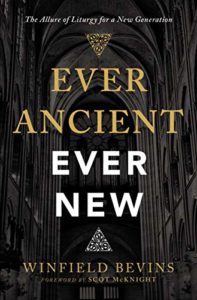 Every Ancient Ever New Winfield Bevins (Zondervan) $16.99 Bevins has written a lot over the years – he is a wise and admired United Methodist professor and director of church planting at Asbury Seminary in Wilmore, Kentucky. I didn’t need to glance at this for more than a second to know that it is one we should think about and one that many should be reading. Many have poked holes in the old chestnut among church people that young folks want “contemporary” worship and that “seeker sensitive” worship must necessarily be informal and pop-rock. Alas, as anyone who has been involved in these discussions for the last 25 years knows, it isn’t that simple. Exceptions abound. Liturgical services attract young people and sometimes when churches who have more conventional Protestant worship styles start a “contemporary” service, (with the often-spoken hope that it will attract the youth) the kids aren’t interested. Been there, friends?
Every Ancient Ever New Winfield Bevins (Zondervan) $16.99 Bevins has written a lot over the years – he is a wise and admired United Methodist professor and director of church planting at Asbury Seminary in Wilmore, Kentucky. I didn’t need to glance at this for more than a second to know that it is one we should think about and one that many should be reading. Many have poked holes in the old chestnut among church people that young folks want “contemporary” worship and that “seeker sensitive” worship must necessarily be informal and pop-rock. Alas, as anyone who has been involved in these discussions for the last 25 years knows, it isn’t that simple. Exceptions abound. Liturgical services attract young people and sometimes when churches who have more conventional Protestant worship styles start a “contemporary” service, (with the often-spoken hope that it will attract the youth) the kids aren’t interested. Been there, friends?
Or you send your non-denominational kid off to college and she comes back talking about collects and homilies and Eucharist and the church calendar and the cool, gospel-centered Anglican priest whose church all the college kids are attending. Yup.
Welcome Ever Ancient Ever New with its vital subtitle “The Allure of Liturgy for a New Generation.” Blevins is wondering a few things in this book, much of it learned from the likes of the late, great, Robert Webber (who coined the phrase “ancient future” back when many churches were grappling with the unsettling we called postmodernity.) He is wondering why young adults leave the church (mainline Protestant and more evangelical ones) and he wonders if a concern for mystery and ritual and beauty and something more somber and thick and deep might be attractive to these restless post-moderns He is wondering in this quick read if there are insights from the creedal and higher liturgical churches and their sacramental worldview that might be useful even to congregations less informed by classic liturgy. He is wondering if there could be some kind of intentional admixture of the best of both worlds, evangelical and lively and liturgical and full of substantive beauty.
Listen to these great quotes that explain the importance of this book:
Despite all the confident, boisterous pronouncements that old forms of worship are dying or dead, liturgical worship — anchored by ancient prayers, enlivened by historic hymns, and centered on the Eucharist — quietly refuses to disappear. In this personal, journalistic look at some of the young adults finding their way back to it, Winfield Bevins helps explain liturgy’s beguiling persistence. This book chronicles a remarkably hopeful trend in today’s churches.”
Wesley Hill, Assistant Professor of Biblical Studies, Trinity School for Ministry
“There is a hunger among this generation to recover the historic roots of the Christian faith for discipleship and mission. Winfield Bevins’ new book offers a clear and compelling account of why young adults across North America are embracing liturgy. If you want to learn more about this movement and why it matters, this book is for you.”
Alan Hirsch, Author of the Forgotten Ways
“Winfield Bevins is an expert on the mission and renewal of the church–and with the research for this book, he is now well versed in the attitudes and practices of young people regarding liturgy and sacrament. Ever Ancient Ever New brings together the best of Winfield yielding something like a field guide to the mix of Gospel, culture, church, young people and liturgy. This is a must read if you are trying to reach and disciple young people in liturgical forms.”
Bishop Todd Hunter, Author of Giving Church Another Chance
Younger Christians are being spiritually renewed today through ancient Christian worship, community, and spiritual practice. Weaving wide-ranging research with scholarly wisdom, Winfield Bevins tells us their stories — and we find ourselves renewed, as well.
Joel Scandrett, Director of the Robert E. Webber Center, Trinity School for Ministry
MY TWO FAVORITE BOOKS of NARRATIVE NONFICTION – CREATIVE, VIVD REPORTING and ASTUTE REFLECTION
I love books that tell a story, but aren’t exactly a memoir, what some call “personal journalism.” Over the years we’ve touted many, some that have gone on to win Pulitzer Prizes and find their way to best sellers lists. What category are books like Factory Man: How One Furniture Maker Battled Offshoring, Stayed Local – And Helped Save an American Town by Beth Macy or Finding Beauty in a Broken World by Terry Tempest Williams or Amity and Prosperity: One Family and the Fracturing of America by Eliza Griswold or the stunning The Boys in the Bunkhouse: Servitude and Salvation in the Heartland by Dan Barry or Almighty: Courage, Resistance, and Existential Peril in the Nuclear Age by Dan Zak that tells the story of protestors at a nuclear weapons site in ways that is informative and inspiring. These are some of my favorite reads in recent years, lively, well written, and powerful testimonials.
Well, this first book is the best of this sort I read this year, newly issued in paperback in 2019. What a delight to get to award this as one of our Hearts & Minds favs. What follows is less reporting, but a collection of essays, observing a variety of locations. It is marvelous, if hard to categorize. I love these books!
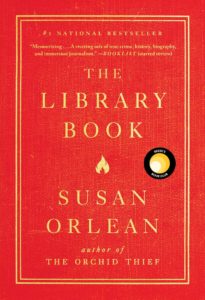 The Library Book Susan Orlean (Simon & Schuster) $16.99 Do you know the work of Susan Orlean, a staff writer for The New Yorker since the 1990s? She has written bunches of books, from travel writing to The Bullfighter Checks Her Makeup which is subtitled: My Encounters with Extraordinary People and is an unbelievable good writer. She is best known for the international best seller The Orchid Thief: A Story of Beauty and Obsession. Perhaps you’ve seen the film “Adaptation.”
The Library Book Susan Orlean (Simon & Schuster) $16.99 Do you know the work of Susan Orlean, a staff writer for The New Yorker since the 1990s? She has written bunches of books, from travel writing to The Bullfighter Checks Her Makeup which is subtitled: My Encounters with Extraordinary People and is an unbelievable good writer. She is best known for the international best seller The Orchid Thief: A Story of Beauty and Obsession. Perhaps you’ve seen the film “Adaptation.”
And so, this is not just a quirky book lovers pick because it has “library book” in the title. Nope, this is so well written, I read pages and pages out loud, for night after night to Beth while we were supposed to be doing other things. I was captivated, and she was too – Orlean’s pages about going to the library as a child just captured our hearts and reminded us of our youth. (Beth’s mom was a librarian, after all.)
But, yet, The Library Book is closer to a true crime story because, well, it actually is about the investigation of the largest fire in the history of Los Angeles and the largest library fire in American history. On April 29th, 1986 it would have been on the front pages of every paper in the country as the enormous blaze consumed more than a million books (including rare archives, maps, and so much more) except that was the day of the world-threatening Chernobyl nuclear disaster in the Soviet Union, which stole all the headlines that day.
The Library Book has been called “irresistible” and “a meandering masterpiece” and “a sheer delight” in part because it does tell the broader story of the role of books and libraries and librarians in a remarkably fresh way. But thirty years after the fire in the Los Angeles Public Library, the crime had not been solved. Orleans used her investigative journalistic chops to explore the story and reconstruct not only the awful day (what writing that entailed – you could feel the heat!) but launched a further investigation into if the fire was intentionally set (as was suspected) and if so, who, and why.
Of course anybody who loves books will, surely, find this endearing, as much of it is a lovely tribute to the power of books and their writers, readers, and sellers and purveyors. Come on, what book person can resist a book called The Library Book, researched and written by a woman one prominent critic called “a national treasure.” Ms Orlean travels widely in this journey, so it is more than just about the fire and the loss of books and services at the library, but that fateful day (and the mystery of its failed investigation) grounds the narrative.
One kind of funny sort of thing for some of us popped up early. As a clever device that she uses, the author (or book designer) has at the front of each chapter the library-card-looking Dewey Decimal-ish rendering of a book title and author, properly listed, I guess conjuring up images of the lost books from the fire, each offering some random hint of what that chapter is about. In the first chapter – I gather merely because of the overt title – a book title appears that is entitled To Begin At the Beginning. Well, that is actually one we stock now published by Eerdmans, written, as she notes, by Martin Copenhaven, a popular writer for Christian Century and a beloved UCC leader and seminary President. To see that book that I have held in my hands quit recently listed – presumably an early edition lost in the 1986 L.A. tragedy, was haunting. Who knew an obscure theology text by a UCC pastor would make its name into the chapter heading of one of the best-selling writers of recent years? Interesting, eh? Kind of like that time the Multnomah book Radical by David Platt made its way into a scene on the hit NBC show “Madame Secretary.” Sorry to digress; we book people take little joys in these serendipities.
Anyway, we are very happy to celebrate and honor The Library Book by Susan Orlean and commend it to our Hearts & Minds friends. You’ll love it.
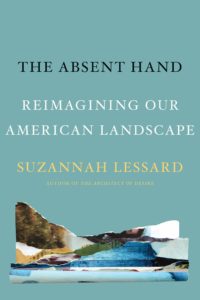 The Absent Hand: Reimagining our American Landscape Suzannah Lessard (Counterpoint) $26.00 I try to pay attention to the releases from this important publishing imprint (known for doing some of Wendell Berry’s best work) as they always do handsome books that are well written and substantive. This one was by a writer who has done highly respected, well-crafted pieces of journalism for The New Yorker for decades and was a founded editor of The Washington Monthly and who was known for the very wonderful The Architect of Desire: Beauty and Desire in the Stanford White Family.
The Absent Hand: Reimagining our American Landscape Suzannah Lessard (Counterpoint) $26.00 I try to pay attention to the releases from this important publishing imprint (known for doing some of Wendell Berry’s best work) as they always do handsome books that are well written and substantive. This one was by a writer who has done highly respected, well-crafted pieces of journalism for The New Yorker for decades and was a founded editor of The Washington Monthly and who was known for the very wonderful The Architect of Desire: Beauty and Desire in the Stanford White Family.
That she was doing the kind of work that I imagined might be likeJames Howard Kunstler (Geography of Nowhere and Home from Nowhere) or Jane Jacobs, or, in admiring the natural landscapes, maybe Annie Dillard or Terry Tempest Williams or those authors that enjoy telling us about their sense of place like Scott Russell Sanders. When I heard that in one of her chapters – about King of Prussia, a few hours away from us near Philadelphia – she was inspired by Joel Garreau’s Edge City: Life on the New Frontier (which I was always intrigued about but never read) I was sure I’d want to read this.
The rave reviews on the back from Bill McKibben, who promises of this author with such a penetrating intelligence, “Reading this book will, no kidding, let you look at the world in a new way, and that is a remarkable gift” didn’t hurt, either. That the president of the Foundation for Landscape Studies said that Lessard immersed herself in particular landscapes “in order to parse their broader underlying meanings ranks her style with Thoreau’s experiential mode of writing” helps explain the experience I had enjoying it so. It was one of the most memorable and pleasurable and informative experiences with a book I had this year.
In truth, one of my fondest memories this entire year is sitting outside under a nearby backyard tree with an almost adequate light, sipping something and savoring the rich, thoughtful writing and this demanding, sublime prose.
Elizabeth Barlow Rogers says of The Absent Hand,
The book is pitch-perfect and filled with cogent philosophical interpretations, a loving and shrewd appraisal of the physical fabric of our once-and-still beautiful but fraught country.
Witold Rybczynski wrote in The Wall Street Journal:
Unusual and engaging . . . A subjective, Whitmanesque meditation on the way we live today . . . What makes this book compelling is not so much where the author goes, but how she reflects on what she sees when she gets there . . . Her wonderfully trenchant observations cast new light on the everyday.
Ms Lessard is asking of herself and of us to ponder what is beautiful in what we see in our world around us (from beach plums to Ramada Inns) and why we care, why it matters. Whether we are observing a wilderness or rural area, a small town, a standard-fare development in a suburb, a dense urban city or that now common, previously mentioned “edge city” (between the exurb and the city proper, a sprawl of businesses and malls and industry that has a zip code but no residents) we must wonder: what is good, what is bad, what was lost, and what night be renewed?
Her keen observations “explaining the details most of us skip past” (as James Fallows notes) are substantial but beautifully crafted. The places she visits and what she sees and reflects upon in those places is estimable, surprising, at times.
Lessard visits so many places and finds so much endearing and perplexing. The first part is called “Listening to the Fields” and she spends time in her upstate New York village, explores suburbophobia, has a splendid chapter about Gettysburg, another about Natchez, and more.
Part Two is called “The Hollowed City” and she spends much time in her beloved New York (including a chapter called “The Pumpkins of Bergen Street”), has a great piece on markets, and then goes to Youngstown, Ohio. There is more about urban life and the interface of the natural landscape and the built environment.
Part Three is splendid, seriously studying “The Absent Hand” and she writes about “The Corporation in the Woods” and “Atopia” and questions “Whose Hand?” My, my, you’ve got toe read the allusive and powerful chapter called “The Inverted Cradle.” This isn’t cheap or breezy, but it is rich and luminous and, at times, grave.
The Absent Hand was one of my very favorite books of 2019 and, I believe, a very important one. Order it today. There will be a paperback edition coming in March, which will be less expensive. Pre-order it today if you’d like…
PSYCHOLOGY AND PERSONAL GROWTH
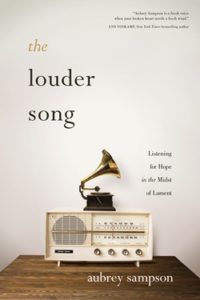 The Louder Song: Listening for Hope in the Midst of Lament Aubrey Sampson (NavPress) $15.99 When we promoted this as a pre-order early last year we called it “stunning.” Here is what else we wrote about it:
The Louder Song: Listening for Hope in the Midst of Lament Aubrey Sampson (NavPress) $15.99 When we promoted this as a pre-order early last year we called it “stunning.” Here is what else we wrote about it:
The Louder Song by Aubrey Sampson is very well written and exceptionally thoughtful. I will admit, there are oodles of spiritual books that tell of the great suffering people have gone through. God helps folks cope, and it is a great grace. Some of the stories are heart breaking and heart warming. Whether they are beautifully rendered or plain, there is something moving about reading the stories of others journey into the depths and coming back out, chastened, sobered, but alive and still loving God and God’s people.
I have an allergy to books that offer clichés, though, or answers that sound too easy. Some of these sorts of books about making sense of suffering tend that way and we avoid recommending them. It is hard to match the pained, spare eloquence of Nicholas Wolterstorff’s Lament for a Son or the hard-won but faithfully raw insight of Gerald Sittser’s A Grace Disguised: How the Soul Grows Through Loss.
And so, I’ll admit, when I read the long list of tragedies that befell this young woman — herself struck with a painful, chronic illness — I feared it would just be another rather sentimental story of God’s love for her through it all, fine but not terribly substantive. But, my-oh-my, is this a strong, thoughtful, gripping book. Yes, Aubrey Sampson has suffered more than most, and yes, she tells about her grief and loss and struggle and pain. But this is also an apologetic for and study of lament, one of the few very good, accessible books on this topic. In The Louder Song she explores what it is like to have exploding grief and to be able to cry out; how, indeed, God uses lament to lead us between (as she puts it) “The Already and Not Yet.”
Ms. Sampson says,
God sings a louder song than suffering ever could, a song of renewal and restoration. Lament helps us hear God’s louder song.
I really appreciate her shameless honesty, her devout piety, her robust faith, and mature spirituality. I liked her stories. And I commend her good scholarship — she is not just writing out of her own experience, rich and formative as it is, but she’s done the reading and thinking and processing of good Biblical and theological scholarship. How many evangelical testimonials of this sort integrate the insights about lament from, say Claus Westermann [who I first read because Brueggemann cited him so much] or the old Puritan Thomas Watson or modern thinker N.T. Wright? To see an author quoting Bono and Soong-Chan Rah and Lament for a Son and Marva Dawn and, of course, Michael Card’s Sacred Sorrow shows she’s got a thoughtful, balanced, creative, approach. To see Tim Keller and Anne Lamott in the same book makes me smile. To draw on progressive Africans like Mpho Tutu and stuffy Anglos like C.S. Lewis (and a quote from the Jeffrey Eugenides novel, The Marriage Plot) shows this is super interesting and well-edited.
There is a good listing of Bible verses on which those who are suffering can draw upon. There’s a thorough guidebook full of discussion questions for personal or group use.
The Louder Song is a strong, important book and we highly recommend it. After reading so many good books about personal health and well-being, growth and grief and such, it stands out as one of the very best of the year. Kudos!
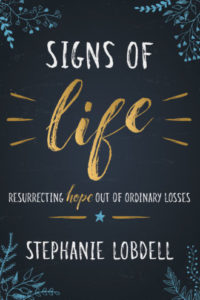 Signs of Life: Resurrection Hope Out of Ordinary Losses Stephanie Lobdell (Herald Press) $16.99 There are so many books written about coping with life’s hardships, with grief and loss and moving on and getting buy. So many tell hard stories, or they tell fairly ordinary stories in dynamic ways. A lot of them are pretty energizing and some have deep wisdom. But something often seems off; they are too glowing or too formulaic. Even the ones promising passion and authenticity and guts and grit are written by pretty bloggers who, if their lives were as raw as they claim, wouldn’t have time or the stomach for that kind of photo shoot and platform. There are a lot of fine books that are popular and helpful, but I’m impressed most with ones like this. This is wonderfully written without a lot of extraordinary drama or visionary zeal. She’s what we sometimes call “the real deal” or “salt of the Earth.”
Signs of Life: Resurrection Hope Out of Ordinary Losses Stephanie Lobdell (Herald Press) $16.99 There are so many books written about coping with life’s hardships, with grief and loss and moving on and getting buy. So many tell hard stories, or they tell fairly ordinary stories in dynamic ways. A lot of them are pretty energizing and some have deep wisdom. But something often seems off; they are too glowing or too formulaic. Even the ones promising passion and authenticity and guts and grit are written by pretty bloggers who, if their lives were as raw as they claim, wouldn’t have time or the stomach for that kind of photo shoot and platform. There are a lot of fine books that are popular and helpful, but I’m impressed most with ones like this. This is wonderfully written without a lot of extraordinary drama or visionary zeal. She’s what we sometimes call “the real deal” or “salt of the Earth.”
I was hooked already by the table on contents but the first few pages were so well written and so honest about a befuddling interpersonal conflict misunderstanding that I knew this was going to be a book I wanted, needed, and was artful enough to keep my attention. I love the notion of “ordinary losses” a phrase I’ve only seen in a precious few books. On the back cover of Signs of Life it says “every day we lose a little bit of something.” And what she wants to know – what she and her husband were asked by their pastoral supervisor in the conflicted churched, is: Is the resurrection enough? Is God’s grand saving action in the cross and resurrection enough to bring life to weary folks, those whose career plans have withered or whose friendships have falters or whose zeal for faith has waned.
“In candid and artful prose, Lobdell shares stories of her own depression, loss of confidence, and disillusionment with the church,” She also does good Bible explorations, telling of biblical characters who faced “ordinary death and also God’s reviving power.” It’s a good, good book, honest and one I found unusually helpful. As Courtney Ellis puts it, Signs of Life offers “hard-earned hope for the weary soul.” As Beth Felker Jones of Wheaton College writes, “Lobdell helps us confront the hard realities of daily life and points us to the unchanging goodness of the God who brings life out of death.”
Not only is she a good writer, but (as is important to me) she offers great quotes from important authors. A quick glance at the footnotes shows citations from everybody from Martin Lloyd-Jones to Phyllis Trible, from Henri Nouwen to Walter Brueggeman, from The Jesus Storybook Bible to Barbara Brown Taylor. Not bad for a Nazarene pastor on a Mennonite publishing house.
This was one of my favorite books of 2019 not only because of the fine, honest writing, but because of the topics. She explores a certain “ordinary” loss in each chapter: the death of zeal, the death of her sense of the future, of plans, expectation, hope. She continues in chapters that are poignant and helpful, admitting to the “death” of her hopes for revival, for beauty, of invincibility and of image. This is remarkable stuff, and it’s a truly insightful read.
And, of course, again, the antidote to these little losses and daily deaths is life, life abundant, the resurrecting power of Jesus. It isn’t cheesy or triumphalistic but it is good, good news. I recommend it.
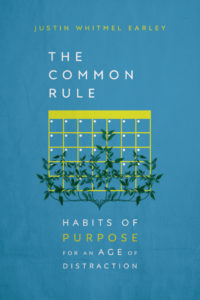 The Common Rule: Habits of Purpose for an Age of Distraction Justin Whitmel Earley (IVP) $18.00 I do not do well with time management books, admittedly to my detriment (and the detriment of those who have to wait for me, or live in my unsettled wake. I know.) I do not think I’m alone in finding guidebooks and manuals, workbooks and formulas, rules of life and programs for this or that a bit off-putting (and, in any event, not very effective.) How can we live into a balanced and thoughtful way of life that makes sense of things, helps us say yes and say no to stuff, live well with such a grand quest for margin and balance turning into a shtick or formula?
The Common Rule: Habits of Purpose for an Age of Distraction Justin Whitmel Earley (IVP) $18.00 I do not do well with time management books, admittedly to my detriment (and the detriment of those who have to wait for me, or live in my unsettled wake. I know.) I do not think I’m alone in finding guidebooks and manuals, workbooks and formulas, rules of life and programs for this or that a bit off-putting (and, in any event, not very effective.) How can we live into a balanced and thoughtful way of life that makes sense of things, helps us say yes and say no to stuff, live well with such a grand quest for margin and balance turning into a shtick or formula?
Taking the old Benedictine rule of life notion into a 21st century, on-line world, Earley started thinking of helpful ways his community could help each other be what they most deeply wanted, by entering more fully into a communal practice of discerning life-giving habits. He’s been influenced by the notions of “cultural liturgies” as found in Jame K.A. Smith and “finding God in the ordinary” (a la Tish Warren.) He’s thought well, experimented faithfully and consciously, and is a good writer, reporting back what he has learned. In so doing he has written what I think is one of the best books in this genre in many a year; it is interesting, based on serious cultural and theological considerations, but really, really practical. It will help you find focus and balance and health, I am sure.
Earley created this tool as a way to help us in human-scale, healthy, (and, I might had, fairly hip and artful) ways. With some nice color and some great graphics and lovely little charts, Common Rule warmly invites us to this kind of intentional Christ-centered life.
I wrote about all this at BookNotes when it first came out, suggesting it wasn’t just solid and useful, like eating your vegetables, but is truly nice, artful book with the graphics and colored ink and gentle guidance and all. Soon, we heard reports of those who wanted to work through it together, of on-line book clubs and small groups and webinars and family meetings. The book was taking off and it seems like it is increasingly appreciated, bearing fruit, being used to help folks settle down, form roots, craft a good life. That Justin is speaking at our upcoming Jubilee conference this February in Pittsburgh is cool, too, and indicative of how this book is resonating with younger audiences. Common Rule: Habits of Purpose in an Age of Distraction is no doubt one of the “books of the year.”
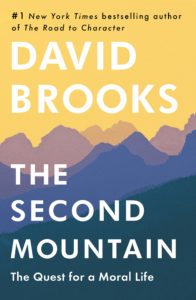 The Second Mountain: The Quest for a Moral Life David Brooks (Random House) $28.00 If you haven’t heard of this, you should know it – Second Mountain has been a big seller across the country and Mr. Brooks is known widely (as a fairly conservative columnist for the New York Times and a regular on NPR and PBS as a political pundit.) We have adored his many New York Times best-selling books – I still count Bobos in Paradise as one of my all time favs – and have admired how he brings together some of the best instincts of those on both sides of the political spectrum. For many liberals he is their favorite conservative and for many conservatives, they jokingly call him their favorite liberal.
The Second Mountain: The Quest for a Moral Life David Brooks (Random House) $28.00 If you haven’t heard of this, you should know it – Second Mountain has been a big seller across the country and Mr. Brooks is known widely (as a fairly conservative columnist for the New York Times and a regular on NPR and PBS as a political pundit.) We have adored his many New York Times best-selling books – I still count Bobos in Paradise as one of my all time favs – and have admired how he brings together some of the best instincts of those on both sides of the political spectrum. For many liberals he is their favorite conservative and for many conservatives, they jokingly call him their favorite liberal.
As was evident in his previous, serious book on virtue (The Road to Character), Brooks is drawn to religious questions and seemed to be increasingly drawn to Christianity. As he says in this amazing new book about emotional and spiritual health as one moves beyond “success” to meaning, perhaps in mid-life or later, he is “a wondering Jew and a confused Christian.”
Yep, in his own “second mountain” David Brooks has found friends among generous scholars at places such as Wheaton College and has sought counsel from the likes of PCA Pastor Timothy Keller and now professes Christian faith. Quiet and nuanced as it may be, this may be the most unsung but notable “celebrity conversion” of many a year. Move over, Kanye, David Brooks is carefully sharing about his new-found faith, citing the influences of William Wilberforce and Dorothy Day and Bonhoeffer and Romero.
Second Mountain is not a perfect book and not all have loved it as much as I do, but it is a very thoughtful study of the quest for meaning in our post-religious age, a secular Jew searching, finally, for purpose and goodness and grace. His embrace of Christianity (as a case study of the search for purpose undertaken after one moves from summiting the “first” mountain towards a second, is one of the most breathtaking stories of the year, explored in mature prose and thoughtful sociological reporting. I suppose it will come out in paperback sometime later this year, but you should read it soon.
A WONDERFUL REPRINT IN A NEW EDITION, DESERVING AN AWARD
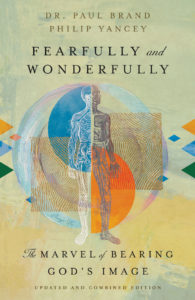 Fearfully and Wonderfully: The Marvel of Bearing God’s Image updated and combined edition Dr. Paul Brand & Philip Yancey (IVP) $25.00 We, of course, as any good bookstore would, stock all of Phil Yancey’s thoughtful and often exquisite books. One of his good friends and heroes (he was, by all accounts, a hero to anyone who knew him) Dr Paul Brand, was a missionary doctor (who specialized in hand surgery, learned in the hard school of treating leprosy in India.) The two of them team up to create to books that ruminated on the physiology of the human body – blood, skin, bones, cells, eyeballs and the like, studying things like breath and balance and pain. Their two books were called Fearfully and Wonderfully Made and In His Image. I had given the first as gifts before we even opened the bookstore, so we, naturally, have long loved these studies.
Fearfully and Wonderfully: The Marvel of Bearing God’s Image updated and combined edition Dr. Paul Brand & Philip Yancey (IVP) $25.00 We, of course, as any good bookstore would, stock all of Phil Yancey’s thoughtful and often exquisite books. One of his good friends and heroes (he was, by all accounts, a hero to anyone who knew him) Dr Paul Brand, was a missionary doctor (who specialized in hand surgery, learned in the hard school of treating leprosy in India.) The two of them team up to create to books that ruminated on the physiology of the human body – blood, skin, bones, cells, eyeballs and the like, studying things like breath and balance and pain. Their two books were called Fearfully and Wonderfully Made and In His Image. I had given the first as gifts before we even opened the bookstore, so we, naturally, have long loved these studies.
Although they are ideal for anyone in health care related fields, they are lovely for any of us with bodies (especially if said bodies don’t work quit as we wished.) Moreover, the draw wise and compelling insights from the endlessly fascinating secrets of the human body and apply them to the Body of Christ and our lives in a diverse world seeking unity and shalom. Praise the Lord that 2019 saw this lovely reissue, adapted and combined – complete with a study guide, created, in part, by one of our own local customers here in Dallastown. Hooray!
TWO NEW BOOKS BY THOMAS LYNCH RELEASED in 2019
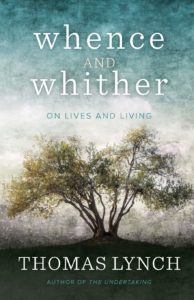 Whence and Whither: On Lives and Living Thomas Lynch (Westminster John Knox Press) $18.00 You know the way it is with us book lovers when we adore an author. We love his or her writing, sigh deeply over the word choices and remarkable sentence structure, admire his or her craft, and eagerly keep eyes peeled for new essays, perhaps, magazine pieces, or, please, maybe even a new book. Or – stop by beating heart! – two books.
Whence and Whither: On Lives and Living Thomas Lynch (Westminster John Knox Press) $18.00 You know the way it is with us book lovers when we adore an author. We love his or her writing, sigh deeply over the word choices and remarkable sentence structure, admire his or her craft, and eagerly keep eyes peeled for new essays, perhaps, magazine pieces, or, please, maybe even a new book. Or – stop by beating heart! – two books.
Whence and Whither is a very handsome hardback with textured paperback cover and deckled edges. Lynch deserves a well-made book because he is, doubtlessly, one of our finest wordsmiths writing these days. His Undertaking: Life Notes from the Dismal Trade and Bodies at Motion and at Rest: On Metaphor and Mortality are extraordinary and seminal in the development of contemporary thinking about the vocation of being an undertaker and among my all time favorite reads. Teaming with Presbyterian minister and legendary preacher Tom Long in 2013, they wrote The Good Funeral, which is the definitive book on the subject.
As you may know, Lynch is a memoirist as well (see his great work Booking Passage: We Irish and Americans) and a poet. Whence and Whither is, as the title suggests, essays about all manner of living which, naturally, includes death and dying, grief and loss, funerals and dispatching the dead. I can’t say enough about Mr. Lynch’s humble style and his eloquent prose and his bold insights about the meaning of his work and of all of our lives and deaths.
You should buy this new book. I might note that I was introduced to Lynch’s first book by one of my dearest friends, the Reverend Thomas Osenbach, who died unexpectedly this Spring and it was one of the last books Tom bought from us in his weekly visits to the shop. He stopped in at least once a week for over 30 years, always buying books, always talking about why people should read, always awaiting good words on good paper.
I read an excerpt about the dignity and value of attending funerals from Whence and Whither at Tom’s packed funeral at a local United Methodist church and knew he’d have thought it fitting. Whence and Whither has become one of the most memorable books of the year for me. Lynch helped me when my own father died in a car wreck in 2000 and he helped us when Tom passed in 2019. We are grateful and commend his rare sort of writing to you.
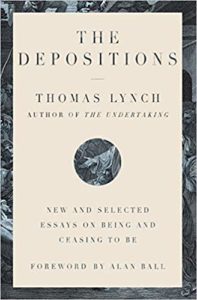 The Depositions: New and Selected Essays on Being and Ceasing to Be Thomas Lynch (Norton) $27.95 Imagine, if you are a serious music fan, consider: if your favorite group, critically acclaimed, intelligent, and a blast to enjoy, did a big, double greatest hits album with some new material (not just one new cut, but five!) You’d just have to get it, right? We are happy to promote this hefty, handsome hardback, a greatest hits release with new content. The publisher calls it “a wry and compassionate” collection so I mean nothing demeaning by calling it a greatest hits double album; it is mature and wonderful and valuable. One reviewer reminds us, plainly, that “for nearly four decades, poet, essayist, and small-town funeral director Thomas Lynch has probed the relations between the literary and mortuary arts…” which is true and notes his “signature blend of memoir, meditation, gallows humor, and poetic precision.” So much more could be said.
The Depositions: New and Selected Essays on Being and Ceasing to Be Thomas Lynch (Norton) $27.95 Imagine, if you are a serious music fan, consider: if your favorite group, critically acclaimed, intelligent, and a blast to enjoy, did a big, double greatest hits album with some new material (not just one new cut, but five!) You’d just have to get it, right? We are happy to promote this hefty, handsome hardback, a greatest hits release with new content. The publisher calls it “a wry and compassionate” collection so I mean nothing demeaning by calling it a greatest hits double album; it is mature and wonderful and valuable. One reviewer reminds us, plainly, that “for nearly four decades, poet, essayist, and small-town funeral director Thomas Lynch has probed the relations between the literary and mortuary arts…” which is true and notes his “signature blend of memoir, meditation, gallows humor, and poetic precision.” So much more could be said.
The Depositions really is an essential set of selections from Lynch’s various sorts of writing and includes remarkable memories, such as a piece about riding in the hearse with the beloved body of Seamus Heaney, and great stuff about his own family of Catholic priests and undertakers and alcoholics and travel and work, not to mention excerpts from The Good Funeral. There are five new chapters that weave together some of his poems and how he came to write them. One, “Miracles” tells more about his own faith and an ecumenical Bible study he attends, even if he doesn’t attended services much these days.
In one of these he is lamenting the loss of several friends, including many from Irish literary circles. He writes:
The witness of these things draw a catch in my breath, that New Year’s Eve morning when we buried Dennis O’Driscoll, in the new row of St. Corban’s Cemetery. Watching his pallbearers lower him into the vacancy of the grave, these mundane mortuary chores replicating the miraculous narrative of the Gospels where the paralytic’s pals lower him into the place of his healing, the “slight lightheadedness and incredulity” perfectly articulated in Heaney’s poem, remains caught in my chest, not yet exhaled, and like the scribes in Capernaum, that day in Naas, though I’d seen such things all my workaday life, I’d “never seen anything like this before.”
A BOOK REVIEW I WANT TO SEND OUT TO THE LATE REV. TOM OSENBACH
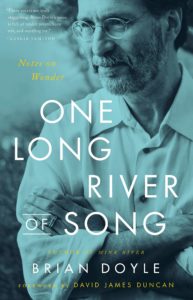 One Long River of Joy: Notes on Wonder Brian Doyle (Little, Brown) $27.00 I mentioned above that it was my friend Tom Osenbach that first encouraged me to read undertaker Tom Lynch. Brian Doyle is another author that we carried (well, at first at least a few of his quirky, artsy books, years ago) who was one of Tom’s favorites, an author that I knew was lovely and creative, but that I just didn’t quite read. In his many years coming in here before his unexpected death this past year, Tom reminded me how much he loved Brian Doyle, his novels, his essays, his poetry, his articles, his short stories. Doyle was an expansive thinker, at turns gentle and quiet, sometimes very funny, often unexpectedly furious, usually gentle and winsome and tender and wise. Tom read almost everything Doyle wrote; he often said that he sent donations to a Catholic College just so he could could get their brilliant alumni journal, a literary mag called The Portland Review for which Doyle regularly wrote and edited. Talk about a loyal reader. When we got One Long River of Joy this December I shed a tear or two, knowing I would have called Tom the day it arrived and he would have come in promptly for it.
One Long River of Joy: Notes on Wonder Brian Doyle (Little, Brown) $27.00 I mentioned above that it was my friend Tom Osenbach that first encouraged me to read undertaker Tom Lynch. Brian Doyle is another author that we carried (well, at first at least a few of his quirky, artsy books, years ago) who was one of Tom’s favorites, an author that I knew was lovely and creative, but that I just didn’t quite read. In his many years coming in here before his unexpected death this past year, Tom reminded me how much he loved Brian Doyle, his novels, his essays, his poetry, his articles, his short stories. Doyle was an expansive thinker, at turns gentle and quiet, sometimes very funny, often unexpectedly furious, usually gentle and winsome and tender and wise. Tom read almost everything Doyle wrote; he often said that he sent donations to a Catholic College just so he could could get their brilliant alumni journal, a literary mag called The Portland Review for which Doyle regularly wrote and edited. Talk about a loyal reader. When we got One Long River of Joy this December I shed a tear or two, knowing I would have called Tom the day it arrived and he would have come in promptly for it.
And so, with some sadness and also great joy I want to tell you that my late pal Tom would have purchased this One Long River of Joy and would have exclaimed that this collection of essays by the late Doyle — he, too, passed this year, at age 60, of a brain tumor — was one of his favorite books of 2019. It is hardback, sturdy, handsome and maybe the nicest collection of Doyle’s work we’ve yet seen. It has received (not surprisingly) glowing reviews from writers and reviews, calling his essays “mystical” and “astonishing.”
Jane Ciabattari writes that it is “Both ecstatic and sober… it dances on the edge of mortality, tossing out exaltations and questions, and offering a fresh, playful, slant on spiritual writing…a celebration of life, love, and waking each day.”
Here is what the publisher says about it:
When Brian Doyle passed away at the age of sixty after a bout with brain cancer, he left behind a cult-like following of devoted readers who regard his writing as one of the best-kept secrets of the twenty-first century. Doyle writes with a delightful sense of wonder about the sanctity of everyday things, and about love and connection in all their forms: spiritual love, brotherly love, romantic love, and even the love of a nine-foot sturgeon.
Here is another thing Tom, and others who have a cult-like devotion to another writer, David James Duncan (author of The Brothers K and The River Why, as well as a short story collection and a passionate set of ecological essays, My Life As Told By Water that I loved more than Tom did) would have been thrilled to know. Said David James Duncan wrote the foreword to One Long River. He, too, celebrates wonder and goodness and quirky grace in this God-haunted, sad, destabilized planet. Having DJD in on this posthumous project was genius. One Long River of Joy: Noes on Wonder by Brian Doyle is truly one of the great books of 2019. RIP Brian and Tom.
BEST NEW BOOK ABOUT FAITH IN THE WORK-WORLD
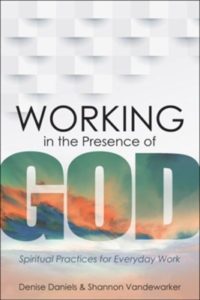 Working in the Presence of God: Spiritual Practices for Everyday Work Denise Daniels & Shannon Vandewarker (Hendrickson) $24.95 Many years there are bunches of books vying for my attention to name and mention at the end of the year. This year is no exception, as you can see – it is hard to name the best book in a given category. However, in this field, although there’s been other very good ones, this book is such a stand out, I must name it as a clear award winner. In our large selection of books in this field (some old, some fairly recent, and some quite new) Working in the Presence of God brings some very, very good contributions and even correctives. We are glad for it, and I must say I enjoyed it quite a lot.
Working in the Presence of God: Spiritual Practices for Everyday Work Denise Daniels & Shannon Vandewarker (Hendrickson) $24.95 Many years there are bunches of books vying for my attention to name and mention at the end of the year. This year is no exception, as you can see – it is hard to name the best book in a given category. However, in this field, although there’s been other very good ones, this book is such a stand out, I must name it as a clear award winner. In our large selection of books in this field (some old, some fairly recent, and some quite new) Working in the Presence of God brings some very, very good contributions and even correctives. We are glad for it, and I must say I enjoyed it quite a lot.
I’ve given a sincere shout out about Working in the Presence of God in a previous column, so I will be brief. I can say three important things about this well written and thoughtful resource.
Firstly, it offers a framework and staring foundation point about work that is essential, excellently explained, and rock-solid. I find that some books in this whole faith-in-the-marketplace field, books about calling and vocation and occupations and careers are sometimes less than clear or a bit sloppy in there framing their enthusiastic story about living out Kingdom ways on the shop floor or in some marketplace ministry. Daniels and Vanderwarker have done the primary source reading and can articulate the best Biblical and theological foundational truths and cite the very best books and leaders for their project. I’m glad for that and commend them for their healthy worldview and their opening chapters.
Secondly, this book does, in fact, strive to help us “practice the presence of God” in our modern workplaces, which is an audacious goal and a much needed assist to those of us who talk about finding God in the science lab, the classroom, the shop floor, the lawyer’s office, the marketplace, the arts studio, or sports field. We say these things and it preaches well – indeed, God is Lord of all creation and there is no sacred/secular divide; we can find God everywhere and serve God in all we do. But, really, at least in terms of a sense of the Spirit’s presence, what does that actually look like? How do we integrate “praying without ceasing” into the hectic world of our jobs and careers? So, yes, this book helps us learn to be mindful of the very holiness of God in our midst.
As Richard Mouw puts it in his back cover blurb:
We’ve had some wonderful studies in recent years about the theology of work and also about spiritual formation. In this book, the two come together in marvelous ways. The authors aren’t just telling us that we should be workers who also happen to have a spiritual life. They help us to practice the presence of God as we engage the real stuff of our working lives. . . . Practical wisdom abounds in these pages!
We are glad for books that study the ethics of market-driven capitalism and about finding Kingdom values in how we pursue our work-world practices and choices. But this book on spiritual formation in the work world adds a great component to the larger faith at work movement.
Congratulations to Henrickson (who has done Bible studies and other books resourcing this movement for years) for doing this good book. I’ll admit I wish the cover was more attractive, and I don’t like that it’s an expensive hardback. But still, it’s a gem – and with endorsements on the back from Tom Nelson of Made to Flourish and Katherine Leary Alsdorf (Vice President of Redeemer City to City’s Global Faith & Work Initiatives) I’m sure this book will become increasingly known in our movement. Remember, you saw it here, celebrated as one of the best books of 2019.
BOOKS OF PUBLIC THEOLOGY, POLITICS, and PERSPECTIVES IN SEARCH OF THE COMMON GOOD
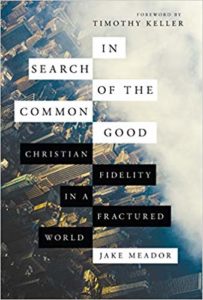 In Search of the Common Good: Christian Fidelity in a Fractured World Jake Meador (IVP) $23.00 As you know, I really like books about faith and public life, those whose Kingdom vision is about the Lordship of Christ over all of life. We are avid church folk and are mildly involved in the lives of several denominations and countless pastors, but I’m really most interested in the non-churchy aspects of Christian discipleship – missional, wholistic, what Steve Garber calls “seamless.” And so, I naturally was immediately drawn to this.
In Search of the Common Good: Christian Fidelity in a Fractured World Jake Meador (IVP) $23.00 As you know, I really like books about faith and public life, those whose Kingdom vision is about the Lordship of Christ over all of life. We are avid church folk and are mildly involved in the lives of several denominations and countless pastors, but I’m really most interested in the non-churchy aspects of Christian discipleship – missional, wholistic, what Steve Garber calls “seamless.” And so, I naturally was immediately drawn to this.
And then I read the glowing rave review in the typically moderate style of Presbyterian pastor and thinker and urban church planter Tim Keller, who spent several pages summarizing much that he’s learned about the “Christ and culture” discussions of recent years and lamented the polarizing (and secularizing) impact of the religious right. Keller knows his Charles Taylor and understands our current “God-haunted” 21st century more than most pastors half his age; he brings an astute insight worthy of Bonhoeffer, Kuyper, or, better, Lesslie Newbigin, in these few concise introductory pages. They are really very wise and good.
And then Keller says:
If you are looking for a way forward, I can think of no better starting point than this book.
He then he goes on to say three things, at least, that he likes about Jake Meador and his new book. After spends another good page summarizing various chapters, Keller continues,
So read this book – and then discuss it with someone. Advance the conversation we must have if we are going to make real changes. There’s no more urgent topic for the church in the West than this, and that’s especially true for Protestants and evangelicals. In Search of the Common Good is an important contribution, and I’m glad to recommend it to you.
I echoed Keller’s recommendation and did a long review of it when it came out last June. I noted that he tells a lot of stories about his own rustbelt sort of background, why he loves Wendell Berry and wants to reinvigorate our own ministries of place, and why both a high calling understanding of the vocation of work and a deeper commitment to the local church and Christian community may, in fact, help us heal the frayed and fracture body politic. Meador is super smart but writes so nicely, I could hardly put this down, even as he’s walking us through theories of Charles Taylor and why we have this angst in our secularizing culture and what sorts of virtues are needed to renew “the world outside our heads.” I may have said that I knew it would be on my list of Best Books of 2019.
By the way, yet another reason to visit the CCO’s Jubilee conference website and consider attending (whether you are a college student or not – make the trip to Pittsburgh this February!) Jake will be there, doing a workshop on this book. After all, the wonderful wordsmith and profound theologian Wesley Hill has said that “Jake Meador is one of the most insightful evangelical writers of his generations.” Of course he’ll be at Jubilee!
TWO IMPORTANT BOOKS ON THE QUESTION OF RELIGIOUS LIBERTY
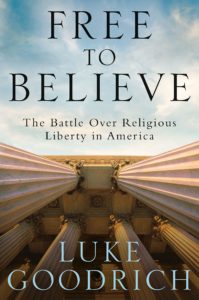 Free To Believe: The Battle over Religious Liberty in America Luke Goodrich (Multnomah) $24.00 I have read a number of books (from several perspectives) about this thorny question of faith-based conscientious objection, about whether or not there should be religious freedom exceptions (such as the bi-partisan policies set in place during the Clinton years which later were codified as RIFRA.) Luke Goodrich works for the fair-minded, pro-religious liberty legal group (The Beckett Fund) that wants to preserve the freedom of religious conscious in a pluralistic society. For instance, his organization (along with other such advocates for religious toleration such as the Christian Legal Society) have worked for the rights of (just for instance) Muslim prisoners to maintain beards while incarcerated as a matter of their religious practice and for the right of certain Native tribes to use otherwise illegal peyote for their religious ceremonies. Naturally, they have sided with the likes of Hobby Lobby and Masterpiece Cake insisting that, agree or not with their conservative convictions about certain sorts of birth control or marriage equality it’s unjust for the State to compel people to betray their deepest, religiously held principles.
Free To Believe: The Battle over Religious Liberty in America Luke Goodrich (Multnomah) $24.00 I have read a number of books (from several perspectives) about this thorny question of faith-based conscientious objection, about whether or not there should be religious freedom exceptions (such as the bi-partisan policies set in place during the Clinton years which later were codified as RIFRA.) Luke Goodrich works for the fair-minded, pro-religious liberty legal group (The Beckett Fund) that wants to preserve the freedom of religious conscious in a pluralistic society. For instance, his organization (along with other such advocates for religious toleration such as the Christian Legal Society) have worked for the rights of (just for instance) Muslim prisoners to maintain beards while incarcerated as a matter of their religious practice and for the right of certain Native tribes to use otherwise illegal peyote for their religious ceremonies. Naturally, they have sided with the likes of Hobby Lobby and Masterpiece Cake insisting that, agree or not with their conservative convictions about certain sorts of birth control or marriage equality it’s unjust for the State to compel people to betray their deepest, religiously held principles.
Thoughtful citizens should immediately ask a few questions about this “religious liberty” claim. It seems pretty obvious (I would think) that the evangelical Masterpiece cake designer shouldn’t be forced to use his talents and artful skills to create cakes that celebrate witchcraft (although he gladly sells his ordinary stuff to anyone, he doesn’t want to be compelled to celebrate the occult by making special cakes; that is one of the cases being considered in Colorado even now, after the Supreme Court ruling in his favor about making cakes for same-sex marriages, of which he disapproves.) But when and where should a citizen’s convictions become protected (being a bigot of any sort isn’t illegal, of course) and at what point is there a compelling public interest for the state to get involved insisting on certain sorts of behavior. Should a Jewish deli owner be forced by law to cater a neo-Nazi party, or may she discriminate and say no? Should a civil rights leader who rents audio equipment be forced to rent to a KKK rally, or should she have the right refuse to serve that customer? What about renting houses to the unmarried or to immigrants? What about the Civil Rights Act of 1964? It’s complicated, eh?
And, further, what about the rights of organizations as such? Should a Young Democrat club on a college campus be required to allow anyone to be their officers or is it discrimination to say one has to be a young Democrat to be a leader in the club? Is it wrong for an environmental club to on campus to insist that their leaders be committed to an ecological viewpoint? As the courts have been debating in recent years, should a Christian student group who takes money as any other official club on campus does on be required to forfeit, as they sometimes are, their by-laws that say they have to hold to the faith statement they have adopted? Can Christian colleges on non-profits hold to their own, distinctive beliefs and hiring practices if their students take government funded student loans? As you know, this has been a major concern of many Christian institutions of higher education and even small Roman Catholic orders of nuns (like the Little Sisters of the Poor who were sued by the Justice Department of the Obama administration when they – duh—didn’t provide birth control coverage in their Order’s insurance policy.)
(I just have to say — you really should read Goodrich on this case, the famous Little Sisters of the Poor v Azar. Of course, the HHS “Affordable Care Act” had given thousands of religious exemptions as per the law of the land — to the likes of Exxon and VISA and Pepsi — but somehow went crazy litigating against this small order of mostly elderly nuns. You can’t make this stuff up.)
I explain all this not because Goodrich describes all of these exact situations (although he does, actually) but because these are the contested matters that are increasingly tying up the courts and it most often gets ugly; good people disagree, but few have studied the topic carefully. It has been my experience that most of the best books on religious pluralism are general (like the excellent University of Chicago title Confident Pluralism: Surviving and Thriving Through Deep Difference by John Inazu) or are very scholarly and arcane, diving deep into precedents and constitutional law. Free To Believe is not a difficult read and is really interesting.
The incivility on this topic is thick; both sides are often blustery. The forces who oppose this pluralistic openness to religious freedom make anyone who doesn’t tow the politically correct line out to be mean-spirited bigots and the religious right who use these episodes as fund-raising for their culture warring war chests make anyone who disagrees with them sound like totalitarian, atheistic nuts. There is plenty of heat on both sides of this debate and there have been missteps, I think, from both sides. Yet, there is reasonable work being done by people like those at the Beckett Fund that deserve a hearing.
This is why I think I want to name Free to Believe by Luke Goodrich as one of the valuable books of 2019. I think I mostly agree with most of this, but that’s not my point. My point is that liberty of conscience is vital for our republic and these questions require great thoughtfulness when it comes to religion in the public square. The rights of individuals and of faith-based organizations need to be adjudicated in light of concern for the common good. Although writing for evangelical Christians, mostly, it seems, he is clear that his organization advocates for all, shoring up the rights of conscience for all (whether you like or agree with their views and practices or not.)
Goodrich is a fine chap – we met him at an event this fall – and we’ve followed his organization (founded by the thoughtful, kind, public intellectual Kevin “Seamus” Hasson) for years. He has argued before the Supreme Court and is one of the most knowledgeable attorneys working in this arena today. Agree or not, this is a valuable book to help frame the conversation about the common good, public justice, and freedom of conscience for people and organizations.
Listen to Professor Robert George of Princeton University (a brilliant scholar who, by the way, goes on the road with his friend African American activist Cornell West, to talk together and illustrate how serious people of differing social visions can be respectful and find common ground.) Dr. George writes:
“As a top attorney with Becket, our nation’s premier religious liberty appellate advocacy law firm, Luke Goodrich has been on the front lines in the battle to protect the rights of people of every faith and shade of belief. With the basic human — and constitutional — right to religious freedom under assault from many different quarters, it is a difficult and ongoing struggle. As Goodrich recounts in his marvelous new book, there have of late been some important and exciting victories in the Supreme Court and other federal and state tribunals. But enormous challenges lie ahead. In meeting these challenges, having an informed and engaged citizenry is critical. That’s why Free to Believe is such a blessing.”
Here’s an endorsement of Free to Believe by a prestigious law professor at Harvard Law:
“With the religious freedoms that Americans have long taken for granted now under fierce attack, Luke Goodrich not only sounds an alarm about the challenges ahead but also offers practical guidance on how to confront them. This wise, faith-filled, and eminently readable book should be in the hands of everyone who values religious liberty.” –Mary Ann Glendon, Learned Hand Professor of Law at Harvard University and author of A World Made New
And this, from a Constitutional law expert and former judge from Stanford:
“Free to Believe is a book for Christians struggling to understand biblical principles of freedom of religion — a freedom that extends to all faiths and even to unbelief. Authors who truly understand the principles of our First Amendment are rare, and those among them who know and love the Scripture are rarer still. Luke Goodrich, one of America’s top litigators in religious freedom cases and a devoted servant of Christ, is both, and his book offers insight, faith, passion, and above all clarity.” –Michael McConnell, director of the Constitutional Law Center at Stanford Law School and former circuit judge on the United States Court of Appeals for the Tenth Circuit
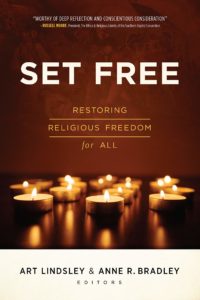 Set Free: Restoring Religious Freedom for All Art Lindsley & Anne Bradley (Abilene Christian University Press) $27.99 You may know my fondness for collections of essays, anthologies which you can dip into and read a chapter or two and move on to yet another chapter or two from a different author or with a different angle. Such collections are not big sellers, oddly, because they seem so very useful. Set Free is just this kind of invaluable resource. Neither Lindsley nor Bradley are lawyers or Constitutional scholars but they contracted some kind of a grant to do this project and set out to find those who could best help us all understand the foundational questions, the solid theology and the controversies around how to build “liberty and justice for all” in our pluralistic culture.
Set Free: Restoring Religious Freedom for All Art Lindsley & Anne Bradley (Abilene Christian University Press) $27.99 You may know my fondness for collections of essays, anthologies which you can dip into and read a chapter or two and move on to yet another chapter or two from a different author or with a different angle. Such collections are not big sellers, oddly, because they seem so very useful. Set Free is just this kind of invaluable resource. Neither Lindsley nor Bradley are lawyers or Constitutional scholars but they contracted some kind of a grant to do this project and set out to find those who could best help us all understand the foundational questions, the solid theology and the controversies around how to build “liberty and justice for all” in our pluralistic culture.
And so, they put together a fabulous cast of players, inviting each to contribute original material.
And what wonderful thinkers and writers are in this Set Free volume – illustrious and important, even if many you may not know. There are some well-known public intellectuals – cultural critic and beloved speaker Os Guinness, who has long worked on the importance of the First Amendment, and Daniel Dreisbach (whose J.D. is from the University of Virginia and PhD is from Oxford, and who now teaches in the department of Justice, Law, & Criminology at American University and is well known as a historian of jurisprudence and a researcher on church-state relations.) Other great chapters include a several on the Biblical teaching about religious freedom, several on the history of religious freedom, and – from Lindsley & Bradley themselves — a bit on the relationship between religious, economic, and political freedom.
Another question taken up is if and in what ways religious freedom is at risk in today’s culture and what can be done about it. Jennifer Marshall Patterson has a great chapter on how preserving religious freedom for all is part of a broader vision of the common good. Mark David Hall has an important piece on the vexing question about religious accommodations and the common good.
One of the very important pieces is by our respected friend Stanley W. Carlson-Thies (who has learned much, by the way, from Dutch statesman Abraham Kuyper’s civic experiment with social and religious toleration in early 20th century Holland) who gives us a chapter called “Free to Serve: Safeguarding Churches and Ministries as They Contribute to Justice and the Common Good.” Stanley runs the Center for Public Justice’s Institutional Religious Freedom Alliance (IRFA) which helps organizations and ministries (of all faiths) maintain their own organizational distinctiveness and understand their own rights in hiring and other institutional practices. His work is profound and extensive – he knows more about the faith-based social service organizations that work in partnership with the government (and the legal basis of all that, based on, for instance, the Charity Choice act from the mid-1990s) and those who have served the common good for decades) than anybody I know.
So, kudos to Art Lindsley & Anne Bradley for compiling this thoughtful reader, this fine introduction to a principled commitment to pluralism and civic, legal toleration. Set Free may not be at your local bookstore or be flying up the charts of the better known on-line dealers, but we want to celebrate it and invite you, regardless of your own position on this complex matter, to check it out, give it some consideration, and discern what you can do to help us all live with our deepest differences in ways that foster respect, civility, and freedom of conscience.
For what it is worth, this question of religious liberty and freedom of conscious is also tied up with what the historians call disestablishment — that is, the separation of church and state, as 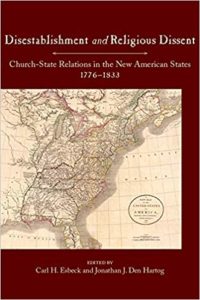 such. Beth and I had the opportunity to premier an amazing book on this with our friend Dr. Carl Esbeck this fall in Chicago. See the new and notable book he co-edited with Jonathan J. Den Hartog Disestablishment and Religious Dissent: Church-State Relations in the New American States, 1776-1833 University of Missouri Press; $45.00.) Congrats to him for editing such a fine book which studies each of the early colonies and how they moved towards this important, essential status. (Perhaps, though, I should get an award for dumbest move of a bookseller this year. When I first heard about this coming out I tried to sell it, sight unseen at that point, to Dr. John Fea, a customer and noted colonial historian. Little did I know at that point that John has a good chapter in it — chapter two, on New Jersey. Well, I tried. Ha.)
such. Beth and I had the opportunity to premier an amazing book on this with our friend Dr. Carl Esbeck this fall in Chicago. See the new and notable book he co-edited with Jonathan J. Den Hartog Disestablishment and Religious Dissent: Church-State Relations in the New American States, 1776-1833 University of Missouri Press; $45.00.) Congrats to him for editing such a fine book which studies each of the early colonies and how they moved towards this important, essential status. (Perhaps, though, I should get an award for dumbest move of a bookseller this year. When I first heard about this coming out I tried to sell it, sight unseen at that point, to Dr. John Fea, a customer and noted colonial historian. Little did I know at that point that John has a good chapter in it — chapter two, on New Jersey. Well, I tried. Ha.)
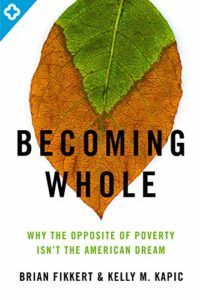 Becoming Whole: Why The Opposite of Poverty Isn’t the American Dream Brian Fikkert & Kelly M. Kapic (Moody Press) $15.99 I described this beautifully made paperback book at great length at a BookNotes column when it came out last Spring. I thought then, and continue to think now, that it is one of the best books of this sort I read this year. It is about worldviews and narratives and social imaginaries, so to speak, and it is a critique of the way in which too many church folks have allowed false stories such as the American Dream to shape our orienting principles, our own story. Yes, Becoming Whole is a prequel to the famous When Helping Hurts so it does get into anti-poverty ministries and alleviating brokenness from the lives of the marginalized. But it is more than a ‘social justice’ manifesto or a handbook for helping wisely. It is a grand vision of how to think about life from God’s perspective. What a clear-headed, helpful teaching tool it is for any of us tempted by the false hopes of the American dream, consumerism, individualism, autonomy, and self-actualization. There really is a better story.
Becoming Whole: Why The Opposite of Poverty Isn’t the American Dream Brian Fikkert & Kelly M. Kapic (Moody Press) $15.99 I described this beautifully made paperback book at great length at a BookNotes column when it came out last Spring. I thought then, and continue to think now, that it is one of the best books of this sort I read this year. It is about worldviews and narratives and social imaginaries, so to speak, and it is a critique of the way in which too many church folks have allowed false stories such as the American Dream to shape our orienting principles, our own story. Yes, Becoming Whole is a prequel to the famous When Helping Hurts so it does get into anti-poverty ministries and alleviating brokenness from the lives of the marginalized. But it is more than a ‘social justice’ manifesto or a handbook for helping wisely. It is a grand vision of how to think about life from God’s perspective. What a clear-headed, helpful teaching tool it is for any of us tempted by the false hopes of the American dream, consumerism, individualism, autonomy, and self-actualization. There really is a better story.
I am eager to insist that this is one of the very good Christian books of this year, and I’m happy to promote it, wishing it would get a wide hearing. It’s important. Here is what people I respect have said about it:
The big story (or the meta-narrative) that one lives by is not benign; rather, it really, really matters. Our brothers Fikkert and Kapic show us how to identify and jettison false meta-narratives, like the American Dream, expressive individualism, and consumerism; so that, we can wisely appropriate and live by the True Big Story found in Scripture for the sake of escorting the poor from their impoverishment to a flourishing position, for the sake of our flourishing and personal wholeness, and for the sake of the flourishing of our communities and cities. Luke Bobo Made to Flourish, ediitor of Fertile Ground: Faith and Work Field Guide for Youth Workers and Living Salty and Light-filled Lives in the Workplace
Thanks to the principles of love and leadership as articulated in this book, as well as in the related work, When Helping Hurts, the church I serve has been able to come alongside disadvantaged, vulnerable, oppressed, and marginalized communities in more informed, life-giving, and sustainable ways. Backed with sound biblical theology and practical guidance and stories, Becoming Whole is a must for any Christian community aiming to make a difference. I can’t recommend this book highly enough.
Scott Sauls, Christ Presbyterian Church, Nashville, author of Befriend and Irresistible Faith.
The kingdom of God is about life as God intends. In Becoming Whole, Brian Fikkert and Kelly Kapic help us understand the robust narrative that the kingdom creates and supports. Unfortunately, we have settled for puny competing storylines that make people poor—in every way. The Spirit is shouting to the Western church to abandon the worldviews and idols that are keeping us from becoming whole. This book serves as a gracious but prophetic invitation to partner with God in his mission to enable us to become fully human.
Reggie McNeal, author of Kingdom Come and Kingdom Collaborators
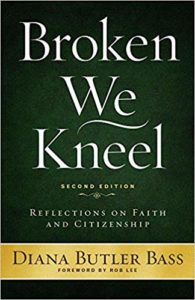 Broken We Kneel: Reflections of Faith and Citizenship second edition Diana Butler Bass (Church Publishing) $18.95 Oh my, I almost started a separate category for this award — “The Best Book to Be Re-Published This Year” or a gold medal for “the most important book I’ve wanted to see come back in print that finally did.” I’m glad for this (and gladly honor it here as I look back at 2019) in part because I just so very much loved it when it came out amidst the war cries and patriotism post-9-11. As a reasonable, thoughtful, Christ-like study of church-state stuff, it is fine. But it is written nearly as a memoir (the sort of personally embedded journalism Diana Butler Bass did so well in her spiritual memoir of various congregations she had been a part of in the lovely and insightful Strength for the Journey: A Pilgrimage of Faith in Community.) In Broken We Kneel she writes poignantly and even painfully about losing a church position because of her disagreements with the flag-waving in the sanctuary. Idolatrous civil religion and “my country right or wrong” dogmatism apparently are not only found among Southern Bible belt evangelicals, but among those who are sophisticated and liturgical and read Bonhoeffer and such. And so she quit.
Broken We Kneel: Reflections of Faith and Citizenship second edition Diana Butler Bass (Church Publishing) $18.95 Oh my, I almost started a separate category for this award — “The Best Book to Be Re-Published This Year” or a gold medal for “the most important book I’ve wanted to see come back in print that finally did.” I’m glad for this (and gladly honor it here as I look back at 2019) in part because I just so very much loved it when it came out amidst the war cries and patriotism post-9-11. As a reasonable, thoughtful, Christ-like study of church-state stuff, it is fine. But it is written nearly as a memoir (the sort of personally embedded journalism Diana Butler Bass did so well in her spiritual memoir of various congregations she had been a part of in the lovely and insightful Strength for the Journey: A Pilgrimage of Faith in Community.) In Broken We Kneel she writes poignantly and even painfully about losing a church position because of her disagreements with the flag-waving in the sanctuary. Idolatrous civil religion and “my country right or wrong” dogmatism apparently are not only found among Southern Bible belt evangelicals, but among those who are sophisticated and liturgical and read Bonhoeffer and such. And so she quit.
This new, expanded edition of Broken We Kneel has a new foreword by one Robert W. Lee, a relative of Robert E. Lee who has just of late become known for renouncing white supremacy and religious sorts of nationalism, which, not unlike Diana, has cost him dearly. Diana has penned a new chapter as a long introduction and a powerful “Fifteen Years Later” afterward entitled “Love — Not Hate — Makes America Great.” If it sounds like a chant, it is because it was; Diana opens the chapter by saying she did not expect to be at a protest against neo-Nazis in Virginia along with parishioners from Christ Church, “protesters clad in Lilly Pulitzer and Brooks Brothers, the preppy seasonal attire of Episcopalians” — the sort of detail that makes Butler-Bass such a fine writer and makes this book an enjoyable read, despite its intensely important heft.
You see, the 2019 edition of the book ends with a church-related controversy not unrelated to the flags in the sanctuary fiasco that precipitated the 2004 edition; historically complicated civic plaques (of Washington and Lee) were taken out of the church sanctuary and relocated to another space on the parish property. Diana puts it mildly when she says “it did not go over well” and it became a larger issue when it became a national media story. Interestingly, she applauds the church’s feisty disagreements as they worked through the conflict. She honors the painful process and observes that the church “was not static, not a chapel to civic piety. No, this was a living place, one that houses a living argument about faith and citizenship. I think they do their best work when the argue,” she writes.
As I explained in my first review of the book a decade and a half ago, and then again early this year when I celebrated Church Publishing reissuing it, the title, Broken We Kneel was a clever alternative to the popular pro-war slogan of the early 2000s, “United We Stand.” Diana insists that there is something in our brokenness and Christ-like humility that draws us to kneel, to pray, that is better than the hoo-rah of hubris. I think she is on to something. I am grateful for all of her books appreciate her as a writer, and rejoice that this book is available in this expanded edition. Highly recommended.
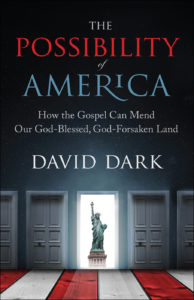 The Possibility of America: How the Gospel Can Mend Our God-Blessed, God-Forsaken Land David Dark (WJK) $17.00 I have been pondering this book for years, it seems. A somewhat different version with a different title came out in 2005 and we raved about it then. This is a considerably re-worked, expanded and obviously updated edition, and it deserves once again to be named as a grave and requisite voice.
The Possibility of America: How the Gospel Can Mend Our God-Blessed, God-Forsaken Land David Dark (WJK) $17.00 I have been pondering this book for years, it seems. A somewhat different version with a different title came out in 2005 and we raved about it then. This is a considerably re-worked, expanded and obviously updated edition, and it deserves once again to be named as a grave and requisite voice.
I would like to share with you some of what I wrote about it earlier. I have to say, I think it was one of my own most memorable reviews – I worked hard on it and tried to honor David and his good work by being a bit feisty in my explanation of his body of work and this new one. I hope you like it; sorry it’s long. I hope it inspires you to buy the book, pronto.
Here goes, from the April 23rd BookNotes:
One of the most stimulating, thoughtful, remarkably-written, and provocative books I’ve read about the state of our times and the state of our union in these times is The Possibility of America: How the Gospel Can Mend our God-Blessed, God-Forsake Land written by my friend David Dark.
David is a lover of words, a lover of truth, a lover of what some call common grace – gladly thanking God for the signs of life that pop up in even a secularized culture, offered up even by those who seem not to be religious. (Ahh, there’s an interesting idea: is anybody really not religious? Don’t we all live by and for something? That’s the theme of Dark’s fabulous book called Life’s Too Short To Pretend You’re Not Religious [IVP; $18.00.] What a fascinating read!)
Discerning the signs of life or signals of transcendence in the common grace gifts of popular culture is the theme of his only slightly dated first book Everyday Apocalypse: The Sacred Revealed in Radiohead, the Simpsons, and Other Pop Culture Icons (Brazos; $20.00.) He has for many years been helping us understand how to understand the culture, how to see the good and the bad, the sacred and the profane. (Or, should I say, the sacred in the profane. And vice versa.)
In a way, then, this new one about America is a continuation of that project, finding how deeply wise and transformative insights show up in the best of our American dreams, from our politics to our classic landscapes, our shaping documents to our best literature and song. I joked to somebody in the shop that he should have called this Everyday American Apocalypse.
The Possibility of America: How the Gospel Can Mend our God-Blessed, God-Forsake Land is actually a considerable re-working and expanded edition of his 2005 book, The Gospel According to America: A Meditation on a Christ-haunted, God-blessed Idea. It is, for those who are familiar with that stimulating, much-discussed book, different enough that it demanded a new title; it is not just a “revised” edition. There’s so much new content in The Possibility of America that it earned a new title; not only is there considerable re-working and new content, the overall tone is a bit different. Understandably. We are in even more desperate times.
It seems to me that the very title indicates a change in the panic level of professor Dark, mirroring the anxiety many of us feel in this contested, Trumpian era. It was a bit easier (not that much, really, for those paying attention, but a bit) to see “the gospel” within America a decade ago. As the subtitle of that first book put it, we were in a “Christ-haunted” land…. These are awful times for the US of A, and it seems that anyone in touch with the Bible and the current political ethos simply has to wish things were otherwise.
Enter David Dark, who once was a bit less outraged and a bit less consumed by the dark antics of our leaders, and who has deepened his long standing passion for Biblical justice and relating prophetic truth to current realities. His writing is hot, on fire this time.
Relating faith to popular culture and current events, by the way, is not new to him. In a weighty introduction called “Notes on the New Seriousness” he talks nicely about his father, a father for whom “the Bible was always in the back of his mind.”
David tells us:
In his lifelong enthusiasm for candor, fair play, and the well-chosen word, freewheeling Bible study as a space in which everything could be talked about (war, celebrity, R-rated films, a living wage) was among my father’s favorite jams. Karl Barth’s dictum concerning life lived with a Bible in one hand and The New York Times in the other was an imperative he took up with glee.
He continues on about lessons learn from his father in this regard; I’m sure many of us envy being raised by a parent who, “as a conversation partner, treated words with an amused affection and reverence… “ Who offered a vibe of “conscience and candor.”
Dark describes his father, a lawyer, as one who understood how we fool ourselves, how we can use our virtue signaling for power, how we “can create or undo the impression of order and control through our use of language.” (Did his father read Derrida, or maybe just Amos and Jeremiah?) Dark talks about “disturbing the fixed scripts of the powerful.” And that “reverence and obsession are to one another near allied.”
“For better or worse,” David says, “I am a child of his obsessions.”
…After talking a bit about his role as a teacher, Dark continues,
I sit in classrooms with women and men in prisons and college campuses, and, together, we make assertions, put questions to one another, tell stories, read poems aloud, and wonder of our own words. They write sentences, I write sentences next to their sentences. And we get a conversation going somehow. We attempt truthfulness together. For some students, I sometimes have the feeling that this might be the first time someone’s calmly and respectfully urged them to think twice.
And, teacher that he is, obsessed with weighing in, he writes, furiously at times, hoping to help us think twice. Perhaps we need to see more clearly the shape we’re in, in this “God-forsaken” land. Or, perhaps, perhaps, we need to see the “possibility.” This book is his love letter to us all, even if it is more troubled and troubling than his first go at it in The Gospel According to America more than a decade ago.
The Possibility of America, as you can tell from the title, is not without hope. Dark believes in the resurrection of Jesus, after all, and he loves our land. He loves our land passionately, concretely, especially as many Southerners do. Although his writing is at times dense and loaded with metaphor and allusion, he is not, finally, an abstract writer. He’s a deep and colorful thinker, but his writing is full of specificity, of place and details, of vim and vigor, as we used to say, salt and vinegar, maybe even fire and brimstone. And empathy and love and the occasional dose of self-deprecation and honest humility. He speaks his mind, tells stories, explores American writers and singers and films, and helps us see what kind of deep patriotic wells we might draw from in order to become more Christ-like and more earnest in our civic lives.
In all this, he seems to be nearly a postmodern, twenty-first century Will Campbell. Campbell, you might know, was a wordsmith himself, published a theological journal, was a bit cantankerous, a Southern Baptist preacher who was a civil rights activist (the only white person at the founding of the SCLC) and yet friends with several Klansman. (“Jesus died for bigots, too,” he famously said.) It comes as no surprise that Dark cites Campbell’s classic memoir Brother to a Dragonfly.
…as he draws on great America literature! Oh my, he starts with James Baldwin, and June Jordon, a hefty sign of where this might be going. He quotes public intellectuals, from Lincoln to Thoreau, from Octavia Butler to Wendell Berry. He loves American lit, and explains Faulkner (a lot of Faulkner), Cormac McCarthy, Melville (and more Melville), Whitman, on to contemporaries Thomas Pynchon, Kurt Vonnegut, Philip Dick, Ursula Le Guin, and Toni Morrison, among others. Who else these days recalls the televised conversation about poetry (and the detached judgment of analysis) between howling Allen Ginsburg and mumbling straight-man William F. Buckley?
David is a very creative writer and some may find him an acquired taste. This is a grand compliment – I regularly say it about two authors I adore, Calvin Seerveld and Daniel Berrigan (and, I suppose, James Joyce, although I haven’t acquired a taste for that kind of weirdness, yet.) It is interesting that David is a student of the poet, priest, and prophet, the late Daniel Berrigan. He thinks like him, it seems to me; he sounds like him.
…Importantly, Berrigan and his famous, activist brother Philip knew Martin Luther King and American resistors such as Howard Thurman and AJ Muste, were mentored by Thomas Merton, befriended by Dorothy Day. These are American icons that Dark is attuned to and to bring their witness into conversations with Faulkner and Stanley Kubric and Americana folk music and Star Trek and The Twilight Zone and rapper Kendrick Lamar is nearly genius; it’s a gumbo mix of high octane social theory, old school American literature, pop culture, and Biblical study yielding a prophetic public theology that could (please God!) lead us closer to Beloved Community.
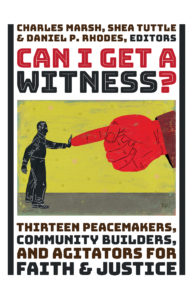 Dark, by the way, did a marvelous chapter on Fr. Berrigan in an excellent anthology edited by Charles Marsh, Shea Tuttle, and Daniel Rhodes called Can I Get a Witness: Thirteen Peacemakers, Community Builders, and Agitators for Faith & Justice (Eerdmans; $26.99) that was created in conjunction with the Project of Lived Theology at the University of Virginia. It, too, deserves acclaim as a notable book of 2019. There are 13 different chapters by 13 excellent writers and thinkers, exploring the embodiment of faith and compassion among 13 faith-based community activists such as Cesar Chavez, Mahalia Jackson, Dorothy Day, and Richard Twiss.
Dark, by the way, did a marvelous chapter on Fr. Berrigan in an excellent anthology edited by Charles Marsh, Shea Tuttle, and Daniel Rhodes called Can I Get a Witness: Thirteen Peacemakers, Community Builders, and Agitators for Faith & Justice (Eerdmans; $26.99) that was created in conjunction with the Project of Lived Theology at the University of Virginia. It, too, deserves acclaim as a notable book of 2019. There are 13 different chapters by 13 excellent writers and thinkers, exploring the embodiment of faith and compassion among 13 faith-based community activists such as Cesar Chavez, Mahalia Jackson, Dorothy Day, and Richard Twiss.
It is Mr. Dark’s The Possibility of America, though, that I want to highlight here as we look back on the most memorable, important books of 2019. Please consider it.
Read the full version of that BookNotes review HERE. Be sure to come back and read the rest of our list of most notable books of the year.
NEW WAYS TO THINK ABOUT FAITH AND CARING FOR CREATION: BEST of 2019
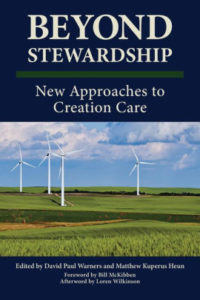 Beyond Stewardship: New Approaches to Creation Care edited by David Paul Warners & Matthew Kuperus Heun with a foreword by Bill McKibben (Calvin College Press) $17.00 I hate to sound like a broken record but it isn’t uncommon that my favorite books of the year and my choices for the most important books of the year are, in fact, books I’ve already reviewed here at BookNotes. When I heard about this one being put together by a team from Calvin University, I knew it would be great. Because one of the dearest friends to Beth and me (Gail Guenst Heffner) was deeply involved in the project, I started to read it the hour it arrived. (Sorry to our staff who sometimes wonders why I’ve disappeared in the middle of the day.) It didn’t take long for me to realize these were ground-breaking, profound, serious, yet accessible essays, and that Beyond Stewardship would be one of the most important contributions to the conversations about Christian creation-care in many a year. A book of the year? Absolutely!
Beyond Stewardship: New Approaches to Creation Care edited by David Paul Warners & Matthew Kuperus Heun with a foreword by Bill McKibben (Calvin College Press) $17.00 I hate to sound like a broken record but it isn’t uncommon that my favorite books of the year and my choices for the most important books of the year are, in fact, books I’ve already reviewed here at BookNotes. When I heard about this one being put together by a team from Calvin University, I knew it would be great. Because one of the dearest friends to Beth and me (Gail Guenst Heffner) was deeply involved in the project, I started to read it the hour it arrived. (Sorry to our staff who sometimes wonders why I’ve disappeared in the middle of the day.) It didn’t take long for me to realize these were ground-breaking, profound, serious, yet accessible essays, and that Beyond Stewardship would be one of the most important contributions to the conversations about Christian creation-care in many a year. A book of the year? Absolutely!
I was glad to honor this book when we first announced it so now allow me to offer our congratulations to the team that put together this innovative volume and who believed that they could (and should) posit something new for our theological vocabulary and imagination when it comes to ecology. In a way it is brave being innovators and reformers, and I hope no one faults them for trying to be faithful in bringing clarity to how we should think about our work in caring for the creation of which we are a part.
To put it (too) simply, the have come to believe – some perhaps more firmly than others in the diverse collection of more than a dozen contributors – that “stewardship” is perhaps not a helpful or accurate word to describe our God-given task to “tend and keep the garden” (Genesis 2.) Are we “over” the other creations and are we called to “manage” and “use” them (even if wisely and lovingly?) They suggest it is hard to be wise and loving when we see ourselves (as heirs to the heresies of the Enlightenment and the myths of progress and capitalism) as apart from and over nature. Not only must we replace “nature” with “creation” we must think of better more ecologically and Biblically honest ways to describe our task as God’s image bearers in God’s good but fallen cosmos.
So there it is. A new conversation suggesting new terminology. Beyond Stewardship covers a lot of ground (and air and water and animals and more.) it’s a gem of a book to read if you care about this topic, and it is a must if you are in any way involved in promoting religious education about creation care. We are all “embedded and dependent upon” the creation of God’s. As Calvin said, it is God’s theatre, God’s household. As professional Alaskan commercial fisher-woman and gifted writer Leslie Leyland Fields (author of Crossing the Waters and The Spirit of Food) says on the back cover, “this multiplicity of smart voices will lead us in new ways to think deeply, theologically, and practically about what it means to care for, nourish, and bless God’s creation.” Three big cheers for a very small press making a truly notable contribution!
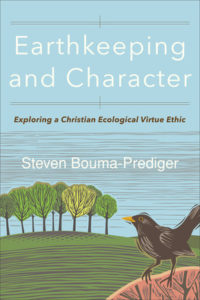 Earthkeeping and Character: Exploring a Christian Ecological Virtue Ethic Steven Bouma-Prediger (Baker Academic) $24.99 I wrote about this tremendous book at BookNotes this fall and I am fully glad to loudly say this was one of the best books I read this year. I loved its semi-scholarly ruminations on virtue theory and character formation and how the writing shifted a bit in tone, just when the going might have been getting heavy, with a splendid story, a surprisingly beautiful Bible exposition, or a mature insight about spiritual formation. In this sense, Bouma-Prediger reminds me a bit of his friend James K.A. Smith; that is, he’s a serious philosopher and a fully engaged cultural activist and a beloved, inspiring teacher with a gift of being a great communicator. He’s not an armchair philosopher or ivory tower thinker; deep as he may be, Bouma-Prediger does his ecological thinking fully immersed in the outdoors (and, it seems, in communion with a broader community of scholars, writers, activists and students.) The stories of taking students camping or backpacking or on ecological field tips make the book really come alive.
Earthkeeping and Character: Exploring a Christian Ecological Virtue Ethic Steven Bouma-Prediger (Baker Academic) $24.99 I wrote about this tremendous book at BookNotes this fall and I am fully glad to loudly say this was one of the best books I read this year. I loved its semi-scholarly ruminations on virtue theory and character formation and how the writing shifted a bit in tone, just when the going might have been getting heavy, with a splendid story, a surprisingly beautiful Bible exposition, or a mature insight about spiritual formation. In this sense, Bouma-Prediger reminds me a bit of his friend James K.A. Smith; that is, he’s a serious philosopher and a fully engaged cultural activist and a beloved, inspiring teacher with a gift of being a great communicator. He’s not an armchair philosopher or ivory tower thinker; deep as he may be, Bouma-Prediger does his ecological thinking fully immersed in the outdoors (and, it seems, in communion with a broader community of scholars, writers, activists and students.) The stories of taking students camping or backpacking or on ecological field tips make the book really come alive.
I cannot get enough of eco-theology and we have written about why we have a pretty hefty creation care/environmental studies section in our store, but, I will admit, many Christian Earth-keeping books are somewhat similar. Bouma-Prediger’s For the Beauty of the Earth remains a standard text, if not the gold standard; I hope you know it. But his new Earthkeeping and Character is fantastic, not least because it brings new stuff into the conversation; it is, in a sense pioneering. This question of character formation—what kind of people must we be if we are going to care well for the planet God so loves? – is essential. It may be one of the biggest questions of our time. How then shall we live? Indeed, even if we can answer that, the deeper question is can we live in such as way? What kind of fruits must we show, what virtues must we embody, what kind of character must we have; who must we be? This is a beautiful, urgent, interesting, very, very important book as this exact question, offering a batch of virtues needed to be the kind of people who can do what must be done. It includes wonder and courage and those chapters are worth the price of the book. Kudos to Baker Academic and the team that put this together.
ON RACE and RACISM
You know we carry a lot of books about racial studies, about black and Latinex and Asian-American and Native People’s books. I mention them a lot here, even if they don’t sell much. Many in the broad evangelical church, it seems to me, care deeply about this topic (and when I say evangelicals, I mean classic evangelicals, not the far right fundamentalists who the media calls evangelicals when they are writing about the religious right.) In any case, it is often evangelical presses that have done the best religious reflection on race. InterVarsity Press stands out, and we often offer kudos for their robust commitments to authors of color and for books about racial justice issues. Other evangelical and other religious publishers are doing good work, too, and we are grateful. Here are two that deserve special accolades this year. It’s a hard call but I want to honor these two, one from a conventionally evangelical publishing hose and the other from a mainstream, New York Times best selling author.
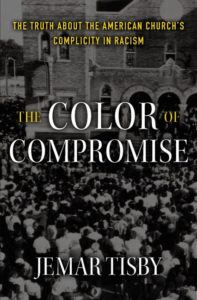 The Color of Compromise: The Truth about the American Church’s Complicity in Racism Jemar Tisby (Zondervan) $21.99 I hope you recall that we’ve mentioned this from time to time, reviewed it earlier at BookNotes and (if you have been with us at various events) may know we’ve pushed it hard. We sold out at Jubilee 2019 when it was new, and we hope the buzz on this book has not subsided. It truly is an historic book in many ways.
The Color of Compromise: The Truth about the American Church’s Complicity in Racism Jemar Tisby (Zondervan) $21.99 I hope you recall that we’ve mentioned this from time to time, reviewed it earlier at BookNotes and (if you have been with us at various events) may know we’ve pushed it hard. We sold out at Jubilee 2019 when it was new, and we hope the buzz on this book has not subsided. It truly is an historic book in many ways.
Jemar Tisby is a young African American who has studied at Reformed Theological Seminary and is working on his PhD in history. He lives in Jackson, Mississippi, and brings a deep commitment to social justice and an obvious awareness of the African American experience to his passionate writing. But yet, this isn’t only a call for the church to repent of its complicity in fostering white supremacy and racial injustices, not only a call to be more intentional about learning about race and white privilege and so forth, but it is, in fact, a history of the churches complicated role in racism in the US. It helpfully starts in the Colonial Era and moves into all the important periods, including the question of Christian slave owners, moves to the abolition efforts and then the Antebellum Period after the Civil War, the rise of Jim Crow and so on. It is lively and well written and even though this is harsh stuff, it is the best overview of this material I think I have ever read. I hope it is sold in every bookstore in the country and carried in every local library.
You may think you know something about these concerns, and I know many of our Hearts & Minds friends know more than we do. For many, though, it is a passing interest, we want to be well informed and our gospel-driven hearts are broken when we hear of the awful stuff people of color sometimes face, but we haven’t read too much. Maybe you’ve watched a documentary about the civil rights movement or read a book by Martin Luther King. Perhaps you’ve read some of the books we’ve named in these BookNotes columns before – I’m Still Here (Austin Channing Brown), White Awake (Daniel Hill), The Myth of Equality (Ken Wytsma), Beyond Colorblind (Sarah Shin), America’s Original Sin (Jim Wallis), Living in Color (Randy Woodley), Beyond Racial Gridlock (George Yancey), Anxious to Talk About It (Carolyn B. Heisel), Woke Church (Eric Mason), The Very Good Gospel (Lisa Sharon Harper) Waking Up White (Debbie Irving) White Fragility (Robin DiAngelo), or any of the many books by John Perkins. If so, good; good on you! But I believe we all, regardless of our political leanings or our own ethnicity, need to know this historic American story about how the churches in the US have been involved in racism and institutional injustices.
Although it is broader and more passionately feisty, I trust you recall us promoting Forgive Us: Confessions of a Compromised Faith by Mae Elise Cannon, Lisa Sharon Harper, Soong-Chan Rah, and Troy Jackson (Zondervan; $22.99.) The Color of Compromise: The Truth about the American Church’s Complicity in Racism should stand next to that one on your bookshelf as a go-to resource to recall what needs to be known and so you are readily able to tell these historical facts to others. Kudos to Zondervan for doing this significant book and to Mr. Jemar Tisby for working so hard on this important book. Check him out at his podcast Pass the Mic, part of The Witness Podcast Network.
Listen to one of our great evangelical thinkers and leaders, Rev. Thabiti Anyabwile, the pastor of Anacostia River Church in DC:
In giving us a history of America and the Protestant Church, Jemar Tisby has given us a survey of ourselves-the racial meanings and stratagems that define our negotiations with one another. He points courageously toward the open sore of racism-not with the resigned pessimism of the defeated but with the resilient hope of Christian faith. The reader will have their minds and hearts pricked as they consider just how complicit the Church has been in America’s original sin and how weak a word ‘complicit’ is for describing the actions and inactions of those who claim the name of Christ!
I am very confident to name this one of the Best Books of 2019, doubtlessly one of the most important. I salute this young historian for helping us all understand the compromises of the past, and how that has effected our present. Thanks to all you have purchased it.
**for what it is worth, we have a few hardbacks left at 20% off of the $21.99 price. Very soon, there will be a paperback edition selling for $19.99. Please let us know if you want the hardback or the paperback.
Also, there is now a 12-session DVD video curriculum with the articulate and passionate Jemar Tisby. It has nearly four hours of content on 2 DVDs. It is called The Color of Compromise: The Truth About the American Church’s Complicity in Racism Video Study. (Zondervan) $29.99.
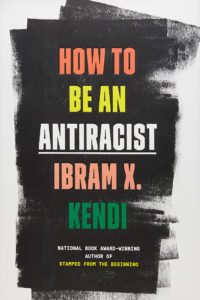 How To Be An Antiracist Ibram X, Kendi (One World) $27.00 You may know the 600+ page National Book Award-winning volume by Ibram X. Kendi called Stamped from the Beginning which was subtitled The Definitive History of Racist Ideas in America (Bold Type Books; $19.99.) It received remarkable attention, even as it was a dense (but readable) study of American anti-black ideas in the history of race. It was important. I mean very important.
How To Be An Antiracist Ibram X, Kendi (One World) $27.00 You may know the 600+ page National Book Award-winning volume by Ibram X. Kendi called Stamped from the Beginning which was subtitled The Definitive History of Racist Ideas in America (Bold Type Books; $19.99.) It received remarkable attention, even as it was a dense (but readable) study of American anti-black ideas in the history of race. It was important. I mean very important.
Now this young historian (Dr. Kendi teaches at American University) who used to be a sports journalist and is also a preacher’s kid, has given us a more personal book, a guidebook to antiracist work, but written partially as a memoir. (His New York parents were Christians influenced by black liberation theology in the 60s who moved him to Northern Virginia as a youth.) I name this thrilling book as one of the most important books I’ve read this year because it pushes the anti-racism agenda directly and yet with personal stories. It made for an engaging and sympathetic read. How to Be an Antiracist has now been called “essential” by Kirkus Review and was given starred reviews from Publishers Weekly and Library Journal, who wrote, “With Stamped from the Beginning Kendi proved himself a first-rate historian. Here, his willingness to turn the lens on himself marks him as a courageous activist, leading the way to a more equitable society.” (This is true, by the way, as Kendi tells some embarrassing stories about his own prejudices and failures by not being an antiracist. Good for him in sharing these anecdotes as a preachers kid.)
Listen to these blurbs from rave reviews and see why I selected it to honor here, too:
“What do you do after you have written Stamped From the Beginning, an award-winning history of racist ideas? . . . If you’re Ibram X. Kendi, you craft another stunner of a book. . . . What emerges from these insights is the most courageous book to date on the problem of race in the Western mind, a confessional of self-examination that may, in fact, be our best chance to free ourselves from our national nightmare.” —The New York Times
“Ibram Kendi is today’s visionary in the enduring struggle for racial justice. In this personal and revelatory new work, he yet again holds up a transformative lens, challenging both mainstream and antiracist orthodoxy. He illuminates the foundations of racism in revolutionary new ways, and I am consistently challenged and inspired by his analysis. How to Be an Antiracist offers us a necessary and critical way forward.” –Robin DiAngelo, New York Times bestselling author of White Fragility
BEST BOOKS ON WHOLISTIC MISSIONAL AND CULTURAL ENGAGEMENT
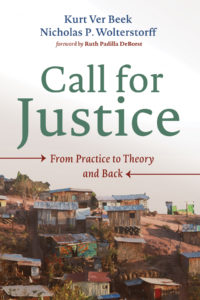 Call for Justice: From Practice to Theory and Back Kurt Ver Beek & Nicholas P. Wolterstorff (Cascade) $26.00 This book just came out at the end of the year and although there are a plethora of great books on social justice, wholistic evangelism, Kingdom mission, and such, there is simply no book we know of that does what this does. It is remarkable and deserves to be celebrated and honored. We are naming it one of the great books of 2019.
Call for Justice: From Practice to Theory and Back Kurt Ver Beek & Nicholas P. Wolterstorff (Cascade) $26.00 This book just came out at the end of the year and although there are a plethora of great books on social justice, wholistic evangelism, Kingdom mission, and such, there is simply no book we know of that does what this does. It is remarkable and deserves to be celebrated and honored. We are naming it one of the great books of 2019.
Allow me to briefly explain what this wonderful, inspiring, and informative book does, and why I think it is so very important.
The story of the book is pretty straightforward. Kurt Ver Beek, Jo Ann Van Engen, and some other professors and friends from Calvin College (now University) years ago starting doing service trips to Central America. They wrote a widely distributed, republished, and debated critique of the value of “short term missions trips” and, to flesh out their own sense of working with local folk, increasingly got involved in the lives and politics and trials and needs of local folks who were working for social change. As these new Honduran friends worked for fair wages, land reform, police protection, local voting rights, and other such basic human rights, they came under persecutions, the sort that are fairly typical among the right-wing despots supported by US military aid in central America. It became clear that perhaps the most urgent matter was not having youth come to do well-intended simple work projects but, rather, to find ways to accompany these local citizens in their efforts for justice for all. There needed to be organizational and institutional heft to their cries for the rule of law.
Ver Beek (who is still a Professor of Sociology at Calvin) and his wife Van Engen created a “Justice Semester” in Honduras for Christian college students. Soon, they helped form the Asociacion para una Sociedad mas Justa — a Honduran NGO “made up of individuals seeking to be brave Christians making the Honduran government work, especially for those most vulnerable” and, then, a US-based non-profit support group, ASJ.
Eventually, Ver Beek and Van Engen convinced their friend and supporter, widely respected Christian philosopher and outspoken justice advocate Nicholas Wolterstorff to join them in Honduras to observe their work. He was struck by the particularities of their civic engagement and wrote a piece about it in The Christian Century, noting some of the exceptional and unique emphases and approaches of the Asociacion. The rest, as they say, is history.
Except for the actual writing of the book, which they both dreamed of, but found it hard to do, since they lived in different parts continent. The holistic, public work of the Honduran citizenship advocacy group (and their US sister group, ASJ) are increasingly known and respected (small and controversial as they may be.) Authors and global Christian leaders like Gary Haugen (of IJM fame) and Ken Wytsma (founder of the Justice Conference) have honored their work creating institutions that can confront corruption and engage broken political systems, but neither Kurt nor Nick really felt like they could put it all in a book about the vision and work and approach of ASJ. What they came up with was genius: Nick and Kurt committed to doing a serious set of letter exchanges back and forth, discussing different aspects of public life, faith-based social change, justice advocacy, and particularly the on-the-ground stories of the efforts of ASJ.
It soon became clear that the flow and structure of the book would be Nick adding what he could from his vantage point as a philosopher of justice (he has written deep and scholarly works on political philosophy and on the nature and attributes of justice) and Ver Beek answering with more practical replies. Or, sometimes, it would go the other way: Ver Beek would start with a specific and concrete detail of their advocacy work and invite Wolterstorff to ruminate on the deeper theological or political implications of it all. Through it all – amidst tender asides and honest notes from obviously two good and Godly friends – there is this “theory to practice” and “practice informed by theory” vibe to all their epistles. The title and subtitle are exactly spot on in describing the flow of the book. That the two authors are among the most reliable voices in their respective contexts makes this an unprecedented collection of correspondence. It is one of the most important resources in this field that I have seen in a very long time.
Call for Justice: From Practice to Theory and Back has a moving and helpful foreword by Ruth Padilla DeBorst that is very, very good. It is dedicated to Dionisio Diaz Garcias who was “assassinated December 4th 2006, a martyr to the struggle for justice in Honduras.” It adds some urgency and importance to a book with a dedication like that, doesn’t it? We are grateful to tell you about it. We are glad to honor it as one of our Best Books of the Year, hoping many NGOs and Christian mission or justice groups study it well. Enhorabuena
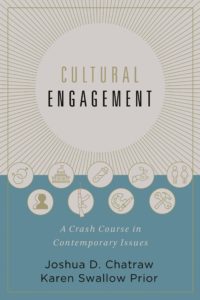 Cultural Engagement: A Crash Course in Contemporary Issues Joshua Chatraw & Karen Swallow Prior (Zondervan) $29.99 I am not always confident that these books that have a dozen different topics in them are that useful. The viewpoints may be shallow or overly biased in one or the other directions and the topics covered may or may not be the most timely. Happily, Cultural Engagement gets is pretty right on both scores.
Cultural Engagement: A Crash Course in Contemporary Issues Joshua Chatraw & Karen Swallow Prior (Zondervan) $29.99 I am not always confident that these books that have a dozen different topics in them are that useful. The viewpoints may be shallow or overly biased in one or the other directions and the topics covered may or may not be the most timely. Happily, Cultural Engagement gets is pretty right on both scores.
First, there are several viewpoints offered in each section of this anthology and while all author seem to be orthodox believers committed to evangelical faith, the views are delightfully and helpfully diverse. There are fine scholars here, writing to a mostly conservative readership, it seems, but they cover a variety of viewpoints and take into consideration various nuances. That is, these are not cheap voices of the religious right who are not informed by thoughtful conservative views, and they are not emotionally-driven activists who haven’t thought through the theologically and Biblically material. Kudos to Joshua Chatraw (director of New City Fellows at Holy Trinity Anglican in Raleigh) and Karen Swallow Prior, friend of Hearts & Minds and author of On Reading Well: Finding the Good Life Through Great Books and Fierce Convictions: The Extraordinary Life of Hannah More – Poet, Reformer, Abolitionist, for being willing to not go boilerplate with this, but to find thoughtful voices and interesting contributors. Granted, the views are offered within a certain evangelical sort of framework, so the voices don’t represent the widest offering available within the big tent of the Body of Christ, but it is more diverse and interesting than you might imagine. It’s a great resource to read up on various pieces on a given topic by thoughtful writers.
Some of these writers include Andy Crouch and Joel Salatin, Robert George and Tish Harrison Warren, Katelyn Beaty and Vincent Bacote, Makoto Fujimura and Ben Witherington. For instance, what a treat in a volume like this to see Rosaria Butterfield in the same section as Matthew Vines (who represent two very different viewpoints on the inclusion of LGBTQ persons within the church) or two see respectful disagreement about the language we use when talking about abortion.
Secondly, the topics are all germane and urgent. From socially contested topics such as creation care, human life and reproductive technologies, immigration, gender roles, war animal welfare, and capitol punishment, there are more general topics as well — thinking about a Christian view of work, for instance, and good stuff on the arts, and the posture we take regarding civic life.
I might wish for a few other perspectives and a few other chapters, but the book already has more than enough. I’m pleased to honor it, and glad to celebrate it.
This book is incredibly needed for ‘such a time as this.’ In this day and age, when rhetoric and worldviews are so divisive, and intelligence with grace and integrity is in short supply, Prior and Chatraw manage to bring together authors who nuance ancient biblical ideas with a wisdom that speaks to the ethical issues of our modern age. Pulling no punches in tackling all the toughest issues, this remarkable one-volume compendium is practically encyclopedic in its perspectives that exemplify goodness, truth, and beauty, while showing that Christians can also thoughtfully disagree on nonessential issues without losing unity in the essentials of the faith. Allen Yeh, associate professor of intercultural studies and missiology, Biola University
FAVORITE BOOKS ON SPIRITUALITY
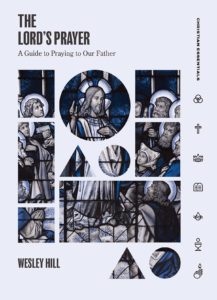 The Lord’s Prayer: A Guide to the Our Father Wesley Hill (Lexham Press) $15.99 I want to be brief in my explanation of this because it is such a wonderful little book that deserves to be encountered by you, gentle reader, in a fresh way, without me citing too much. I will, as is sometimes my approach, just tell you a bit about the author and the book and invite you to trust me on this: it is a marvelous read, spiritually edifying, good for those who are just beginning to study the topic of prayer and good for those who want a brief but lucid theological account of the famous passage in Matthew now called “The Lord’s Prayer” or “The Our Father.”
The Lord’s Prayer: A Guide to the Our Father Wesley Hill (Lexham Press) $15.99 I want to be brief in my explanation of this because it is such a wonderful little book that deserves to be encountered by you, gentle reader, in a fresh way, without me citing too much. I will, as is sometimes my approach, just tell you a bit about the author and the book and invite you to trust me on this: it is a marvelous read, spiritually edifying, good for those who are just beginning to study the topic of prayer and good for those who want a brief but lucid theological account of the famous passage in Matthew now called “The Lord’s Prayer” or “The Our Father.”
You should know that I admire Wes immensely. He is a very good writer – exquisite at times – and although a deep scholar (with a PhD from the University of Durham) and a beloved New Testament professor at Trinity School for Ministry, he wears his academic insights lightly. It is evident, I think, that he has done serious work on Trinitarian theology (not every book on the Lord’s Pray is so significantly Trinitarian) and it is evident that he cares about liturgy (using, in the subtitle, the phrase “The Our Father” indicates his ecumenical sensibilities and give a nod to his Anglican affiliations. He is aware of the recent longings for community among younger adults, especially, and is committed to a Biblically-driven passion for social justice; these come out in the text in lovely, helpful ways, making me all the more eager to promote this fabulous study.
Not only is it thoughtful without being dense and relevant, so to speak, with real-world, very contemporary applications (including a helpful small bit about why saying “Our Father” is, in fact, troubling for some. I appreciate that a theologically conservative Anglican would speak out against patriarchy and invite us to a more well-rounded, Biblical image for the Godhead.)
Another nice touch in this book is its design: it is a slim, compact sized hardback without a dust-jacket with artful graphic design touches and reverse-color ink and classic art. (I am glad there is a black and white reproduction of the Rembrandt painting made famous by Henri Nouwen which serves to anchor Wes’s epilogue, “Praying the Lord’s Prayer with Rembrandt.” The Lord’s Prayer, by the way, is part of a developing series, the second in the “Christian Essentials” set. (The first was Ben Meyer’s exceptional The Apostles Creed (2018) and the third is the brand new The Ten Commandments (2020) by Peter Leithart. All three are really, really handsome.
And look what is on the back, among other equally persuasive endorsements:
Most Christians say the Lord’s Prayer with great frequency and familiarity, so that we scarcely know what we are saying. In this treasure of a book, Hill opens up the prayer with great freshness for the ordinary reader, so that we seem to hear Jesus himself speaking to us, showing us how to pray to his Father in the same spirit that he himself does. This little volume will enrich a reader’s life immeasurably. —Fleming Rutledge, author of The Crucifixion and Help My Unbelief
Kudos to Lexham and, in this case, congrats to Wes Hill for doing such a wonderful, succinct, surprisingly good book on prayerfulness. Highly recommended.
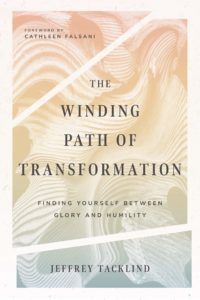 The Winding Path of Transformation: Finding Yourself Between Glory and Humility Jeffrey Tacklind (IVP/formatio) $17.00 We stock all the excellent and moving books in the formatio line published by IVP and they remain some of the best books being published these days on the interior life, spirituality, and walking deeply in ways shaped by the practices of faith that lead us into the ways of Jesus. Yes, that’s a mouthful and while we could just say books in the formatio line are about spirituality, they are not all about prayer and monasticism. As with The Winding Path by Jeffrey Tacklind, many of their books are beautifully written and as much about living a vibrant life in the world as finding that inner quietude that we sometimes think of as spirituality.
The Winding Path of Transformation: Finding Yourself Between Glory and Humility Jeffrey Tacklind (IVP/formatio) $17.00 We stock all the excellent and moving books in the formatio line published by IVP and they remain some of the best books being published these days on the interior life, spirituality, and walking deeply in ways shaped by the practices of faith that lead us into the ways of Jesus. Yes, that’s a mouthful and while we could just say books in the formatio line are about spirituality, they are not all about prayer and monasticism. As with The Winding Path by Jeffrey Tacklind, many of their books are beautifully written and as much about living a vibrant life in the world as finding that inner quietude that we sometimes think of as spirituality.
And so, The Winding Path (with the great, great subtitle – finding yourself between glory and humility) is exactly about the inner transformations that can be found as one is learning about the courage to follow Jesus. As this pastor (with a degree in philosophy and a doctorate in semiotics) learns to enter into suffering he help us all remember that “the way up is down.” He describes his holding various folks who are in conflict together in loving tension – entering paradox. Such a willingness to host tension and paradox and friction and suffering means, as most of us know but don’t often enough ponder, that our path towards God is “ever winding.”
I knew I’d like this book when I read the vivid foreword by the great writer Cathleen Falsani where she names the date Jeff preached the best sermon she ever heard.
She writes,
The Best. Period. Full stop. And I say that as someone who, as a religion journalist, has gone to church for a living for a couple of decades and has been “churched” in one Christian tradition or another from the day I was born. Homiletics (AKA preachin’) is my baseball.
His message that morning, exegeting the fourth chapter of the book of Job from Hebrew Scripture, was a humdinger. Humble, funny, literate, astute, accessible, compassionate, vulnerable, and profoundly, achingly honest. Quintessential Jeff, really.
So, who wouldn’t want to read a book by a guy like that? And then I see amazing blurbs on the back by Ian Cron and Leonard Sweet and J.P. Moreland and Alan Fadling and Jennifer Grant and I’m wondering, who is this guy and why haven’t I read this book yet? (And why does it have such a bland cover that doesn’t convey the electricity and energy and pathos of this vivid book? But I digress.)
Not surprisingly, The Winding Path of Transformation: Finding Yourself Between Glory and Humility challenged me even though it was a thoroughly enjoyable book to read. I honor it also because long after reading it, I find it is an important one to ponder. It has grand ideas but is really down to earth. There is stuff about “small prayers” and a chapter about living between “glory and humility” and one inviting us to be honest about living the questions. (I happen to know he did his doctorate on the theme of “humble epistemology” so his views about “knowing” are not over-confident, thank goodness.) There are plenty of citations from great theologians and plenty of allusions to pop culture yet with all this vim it is gentle, calling us to experience something with God that is authentic and transformative. I will revisit it again, I am sure; I skipped all the reflection questions but they looked excellent. I invite you to get it and enjoy the winding ride.
As Len Sweet says of it on the back, “you will shake your head in marvel and wonderment at its revelations. The promise of the title is real – your own journey will be transformed.”
Kudos to formatio and IVP and Pastor Jeffrey Tacklind for one of the best books on spiritual formation this year.
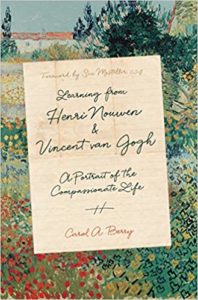 Learning from Henri Nouwen & Vincent van Gogh: A Portrait of the Compassionate Life Carol. A Berry (IVP/formatio) $22.00 For anyone who cares about Henri Nouwen and his gentle, often incisive insights into the interior life, a new book about his teachings would be seen as a notable book any year. Worthy of special celebration — and kudos to IVP for helping bring this to light — is the extraordinary story behind Carol Berry’s Learning from Nouwen and Van Gogh book. You may know that Henri was early in his career a chaplain at Yale and he famously taught a few classes at the Divinity school there. (The fruit of one of those is the popular book Compassion that Nouwen co-wrote.) Just one year he taught a course on the virtues and pains of living a compassionate life and he drew in that class on the life, pain, vision, art, and spiritual of Vincent Van Gogh. Many of often wondered what that class was like, but until recently no one who was actually in the class came forward.
Learning from Henri Nouwen & Vincent van Gogh: A Portrait of the Compassionate Life Carol. A Berry (IVP/formatio) $22.00 For anyone who cares about Henri Nouwen and his gentle, often incisive insights into the interior life, a new book about his teachings would be seen as a notable book any year. Worthy of special celebration — and kudos to IVP for helping bring this to light — is the extraordinary story behind Carol Berry’s Learning from Nouwen and Van Gogh book. You may know that Henri was early in his career a chaplain at Yale and he famously taught a few classes at the Divinity school there. (The fruit of one of those is the popular book Compassion that Nouwen co-wrote.) Just one year he taught a course on the virtues and pains of living a compassionate life and he drew in that class on the life, pain, vision, art, and spiritual of Vincent Van Gogh. Many of often wondered what that class was like, but until recently no one who was actually in the class came forward.
As we explained in our BookNotes excitedly celebration this important book, Berry audited the course (her husband, the divinity student, was taking it for credit) and she took copious notes. She and her husband went on to be mentored by and good friends with Father Nouwen. The Nouwen literary trust who is careful about these things authorized her to write the book based on her good notes and keen memories of this once-in-a-lifetime course.
The book is arranged in three parts and every part has three chapters. She writes beautifully about what she learned about Van Gogh, what she learned from Henri, and what she applied to her own life and her spiritual journey. The three units are on solidarity, consolation, and comfort. It is truly one of the most lovely books about Nouwen we have seen in ages (even though the last few years have seen previously unpublished collections of his mature writings.)
Further, Learning from Henri Nouwen & Vincent van Gogh: A Portrait of the Compassionate Life is made as beautifully and arfully as the topic would demand. InterVarsity Press did a fantastic job with the cover, the page layout, the art pieces and color within, making this a special treat to behold, to study, to give as a gift. All in all, it is one of the most lovely and memorable books of the year!
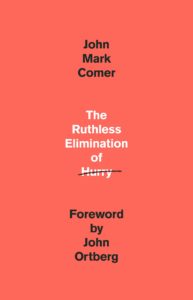 The Ruthless Elimination of Hurry John Mark Comer (Waterbrook) $23.99 This is a book that I’ve mentioned several times at BookNotes, so here is what I wrote right before Christmas when I was touting it as a great gift book. I’m happy to note it here, yet again, as one of my favorite reads of 2019.
The Ruthless Elimination of Hurry John Mark Comer (Waterbrook) $23.99 This is a book that I’ve mentioned several times at BookNotes, so here is what I wrote right before Christmas when I was touting it as a great gift book. I’m happy to note it here, yet again, as one of my favorite reads of 2019.
I did a long, breathy review of this earlier this fall (HERE) and the book quickly became one of our best selling titles of the year. John Mark Comer is fun and cool, the design is hip and youthful, but the content — riffing on a line from Dallas Willard — is perennial, good for anyone who wants to deepen their spiritual lives by slowing down, learning to be mindful, and create transforming space to know God more intimately, so to be remade into the image of Christ. Fun and clever as this is, reading The Ruthless Elimination of Hurry becomes a great way into conversations about spirituality, lifestyles, pace of life, serenity, repentance, discipleship. He writes movingly about Christ’s (easy) yoke. About being an apprentice of the true Lord who shows us what it means to be human. Comer’s Garden City is about vocation and calling, work and rest. It is about being made in God’s image and you can see this new one as a natural follow up, focusing less on the call to work, and more on the call to rest. There is a great foreword by John Ortberg, who calls Ruthless Elimination… a “prophetic word for our time.” It is clearly pitched to young adult readers, but this old guy who turned 65 a few weeks ago (that would be me) thinks it is one of the books of the year!
Okay, I said it then, and I’m sticking to it. The Ruthless Elimination of Hurry by John Mark Comer is of my favorite books of the year. Hooray! Buy it on sale, now — you can slow down after you hurry up and order the thing from us today.
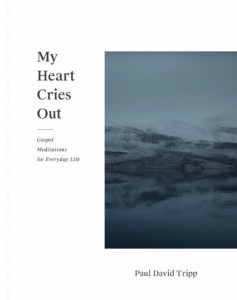 My Heart Cries Out: Gospel Meditations for Everyday Life Paul David Tripp (Crossway) $24.99 This is a book that deserves some award, some honorary mention for a number of compelling reasons, I think. Kudos to the publisher for doing this book so nicely, in a larger sized paperback with full color photos includes. Perhaps a lesser-known author wouldn’t have been given the opportunity to do this outside-of-the box book, but we are glad. Tripp is the author of a number of books which offer a clear sense of the gospel – salvation through faith alone, justification through the Cross of Christ, healthy human restoration based on the hope of God’s mercy, inviting us to grit and glory inspired by gospel-centered teaching that is solid and profound. He’s a counselor and author of books about Biblical counseling. He has written about redemptive understandings to money, to sexuality, to marriage and parenting. He has a book on awe, a book on helping others. His biggest seller, though, is a year-long devotional called New Morning Mercies. It is very good. Here, though, he has given us a book of devotional poetry.
My Heart Cries Out: Gospel Meditations for Everyday Life Paul David Tripp (Crossway) $24.99 This is a book that deserves some award, some honorary mention for a number of compelling reasons, I think. Kudos to the publisher for doing this book so nicely, in a larger sized paperback with full color photos includes. Perhaps a lesser-known author wouldn’t have been given the opportunity to do this outside-of-the box book, but we are glad. Tripp is the author of a number of books which offer a clear sense of the gospel – salvation through faith alone, justification through the Cross of Christ, healthy human restoration based on the hope of God’s mercy, inviting us to grit and glory inspired by gospel-centered teaching that is solid and profound. He’s a counselor and author of books about Biblical counseling. He has written about redemptive understandings to money, to sexuality, to marriage and parenting. He has a book on awe, a book on helping others. His biggest seller, though, is a year-long devotional called New Morning Mercies. It is very good. Here, though, he has given us a book of devotional poetry.
Yep, the heady thinker and systematic Bible counselor has moved to the other side of his brain and has given us an artfully created bit of free verse the comes back, over and over, to our great need – crying out to God – and God’s great grace. It’s a handsome and interesting book and we wanted to name it here. There are poem/prayers he has written over different seasons of his life, sometimes in joy and celebration but often in times of disappointment and confusion. Three big cheers for this vulnerable and creative guide to getting real with God.
If you don’t believe me, listen to rhyme-master hip hop artist and thoughtful author Lecrae, who says:
Poetry is the expression of the heart and mind of a person. When that person reflects on the person and work of Jesus, the expression is hopeful and redemptive. As an artist who uses words as expression, I found joy in reading My Heart Cries Out. This work connects with the human condition in a unique and awesome way.
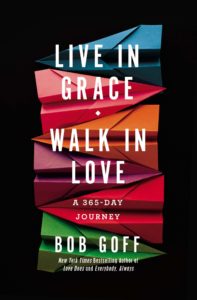 Live in Grace, Walk in Love: A 365-Day Journey Bob Goff (Thomas Nelson) $16.99 We have mentioned this several times at BookNotes, from when we first announced it as a pre-order to suggesting it as a Christmas gift. I have to admit I didn’t read this an entry a day as you’re suppose to, but plowed through dozens of pages at a sitting. I just couldn’t stop – what fun, what good advice, how helpful, inspiring and challenging. I am confident I want to name it as a favorite book of the year, but not sure it should be listed here in this category of books about spirituality; it is not about contemplation or prayerfulness, really, doesn’t cite Henri Nouwen or Ruth Haley Barton or Richard Rohr. But it is (supposed to be) a daily devotional, so I’ll list it here, anyway. Read in prayerfully each day for a year, or swallow it in big gulps. Live in Grace… is a gem that will help you in your faith and discipleship, yes, your knowledge of God and your joy in the Lord.
Live in Grace, Walk in Love: A 365-Day Journey Bob Goff (Thomas Nelson) $16.99 We have mentioned this several times at BookNotes, from when we first announced it as a pre-order to suggesting it as a Christmas gift. I have to admit I didn’t read this an entry a day as you’re suppose to, but plowed through dozens of pages at a sitting. I just couldn’t stop – what fun, what good advice, how helpful, inspiring and challenging. I am confident I want to name it as a favorite book of the year, but not sure it should be listed here in this category of books about spirituality; it is not about contemplation or prayerfulness, really, doesn’t cite Henri Nouwen or Ruth Haley Barton or Richard Rohr. But it is (supposed to be) a daily devotional, so I’ll list it here, anyway. Read in prayerfully each day for a year, or swallow it in big gulps. Live in Grace… is a gem that will help you in your faith and discipleship, yes, your knowledge of God and your joy in the Lord.
Here is a slightly edited version of what I wrote back at BookNotes last fall: Bob is a friend and supporter (is there anybody he meets he doesn’t befriend and encourage?) As you know from Love Does and Everybody Always he is a consummate storyteller, a funny guy who lives in whimsy, and whose adventures – holy capers – are designed to create a better world of love and grace. From offering balloons to the sick to starting a girl’s school in the face of the Taliban in Afghanistan, how does he do it? Bob truly is one of the most unforgettable people we’ve ever met and his energy and cheer befuddles me.
He joked with me the last time we were together that he had thought he might get out of this (with a bit of tongue in cheek and faux bluster, I’m sure) book contract by writing just 30 days of devotions for a nice month-long reader. Oh no, no way! The publisher was not having it – they wanted a full-on 365-day reader of all new content. Stories, Bible studies, inspirational faith-building lessons? Yep, all of the above. An entire year’s worth. Bob Goff has a storehouse of adventures to draw upon and as an old Young Life guy, knows how to re-tell a Bible episode like the best of ‘em. Live in Grace, Walk in Love is a great, great devotional based on Scripture.
These stories will offer a glimpse into the zany and earnest care Bob has for others. For those that may not be familiar with Bob’s extraordinary style, I want to note just two quick things. He’s no theologian (but sure is smart; he does have a law degree and is pretty darn successful in that field.) But he does know the Bible. Some think he’s just all joy and balloons and smiles, but he quotes the Bible all the time. He just does. So don’t underestimate the Scriptural warrant of his dreams and visions of making the world a better place.
Secondly, as I’ve said, Goff does have a blast doing the unexpected, living well in gracious, good ways. That is, this new, yearlong reader could inspire those who are bored, those who are dreamless, those who can’t see that faith or spirituality might be real or exciting. Live in Grace, Walk in Love will be for many un-churched folks, I suspect, the best invitation to the Christ-promised “abundant life” that they’ve ever encountered. Buy it for the young and the old, the faithful and the faithless, the troubled and the overly confident, the light-hearted and the too serious. It will introduce almost anyone to a down-to-Earth faith that gets busy walking in love, relying on God’s good grace.
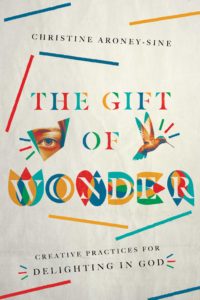 The Gift of Wonder: Creative Practices for Delighting in God Christine Aroney-Sine (IVP) $16.00 There are many books these days that invite us to find God in the ordinary. We have a whole section of books like this with more than a dozen mediations on the spirituality of the mundane. This is one that almost didn’t capture my attention – something about the cover really turned me off – but I know the author and respect her immensely. I’ve read other books of hers about contemplative spirituality and her great little morning and evening prayer book. I also respect her husband, Tom Sine, and appreciate his feisty books to be involved in social change (including the recent Live Like You Give a Damn – Join the Changemaking Celebration.)Together, Tom and Christine have forged an innovative life of service, justice, community, and celebration. If she has insights about living well in the real world, I want to hear them.
The Gift of Wonder: Creative Practices for Delighting in God Christine Aroney-Sine (IVP) $16.00 There are many books these days that invite us to find God in the ordinary. We have a whole section of books like this with more than a dozen mediations on the spirituality of the mundane. This is one that almost didn’t capture my attention – something about the cover really turned me off – but I know the author and respect her immensely. I’ve read other books of hers about contemplative spirituality and her great little morning and evening prayer book. I also respect her husband, Tom Sine, and appreciate his feisty books to be involved in social change (including the recent Live Like You Give a Damn – Join the Changemaking Celebration.)Together, Tom and Christine have forged an innovative life of service, justice, community, and celebration. If she has insights about living well in the real world, I want to hear them.
And what a great book this is, offering very special practices, ideas, proposal and guides for doing all kinds of creative activities to heighten our sense of the sacred, to learn to stand in awe, to deepen our wonder. She invites us to play — like a child! (Didn’t Jesus imply something about being like a child?) Christine is so atuned to the beauty of creation and the way God can speak to us through its speech (think of Psalm 19) she seems a proponent of something akin to a Celtic sort of spirituality (which maybe she learned in her native Australia, who knows?) She sees God’s handiwork all over and helps us lean into an appreciation for a sense of the sacred — and responds even with the occasional poem of doxology. Can we enjoy our faith, enjoy our days, celebrate the goodness (even as we hunger for greater hope and justice?) This book will be a life-giving aid to anyone who takes it up and you can spend years practicing the many suggestions and ideas she puts on offer in The Gift of Wonder. What a fun, good, healthy book.
Jesus talks about childlike trust in God. The apostle Paul writes about compassion and thankfulness. These themes play a big role in Christine Aroney-Sine’s new book. Using stories from the Bible, creative exercises, reflection questions, and her own beautiful poems, Christine addresses the questions of how we can bring joy to God and how we can live out the Christian faith as a journey of discovery. The topics of her book–awe, play, curiosity, creativity, imagination, adventure, and wonder–bring balm to the soul in this age of fear and polarization. She guides us on pathways to experience God’s generous gifts and to grow in contentment and peace in Christ. —Lynne M. Baab, author of Sabbath Keeping and Nurturing Hope
TWO GREAT BIOGRAPHIES
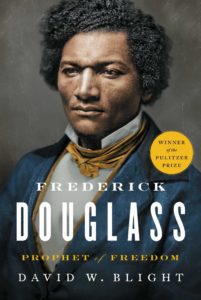 Frederick Douglas: Prophet of Freedom David Blight (Simon and Schuster) $22.00 Okay, I’m not going to actually review this since I have not nearly finished it yet and am hardly competent to do so. (It is over 900 pages, after all; I’m not going to lie – I have a ways to go. But, oh my…) It came out at the end of 2018 and was a pricey, if gorgeous, thick, deckle-edged hardback. It had full-page ads in places like The New York Times Book Review laden with quotes saying it was one of the best books of our time, magisterial, etc. It sold out everywhere immediately and was unavailable for the rest of the year. Early in 2019 it won the Pulitzer Prize in History, earned the coveted Bancroft Prize and the prestigious Lincoln award. I had hoped the paperback would land in 2019 so I could name it as the best paperback release of a former hardback. Given its extraordinary attention and rave reviews (both as a wonderfully-written historical biography and as a every so timely, urgently important reflection on an under-appreciated racial justice warrior) it was highly anticipated and eagerly awaited. Alas, it came the first week of January bearing a 2020 pub date.
Frederick Douglas: Prophet of Freedom David Blight (Simon and Schuster) $22.00 Okay, I’m not going to actually review this since I have not nearly finished it yet and am hardly competent to do so. (It is over 900 pages, after all; I’m not going to lie – I have a ways to go. But, oh my…) It came out at the end of 2018 and was a pricey, if gorgeous, thick, deckle-edged hardback. It had full-page ads in places like The New York Times Book Review laden with quotes saying it was one of the best books of our time, magisterial, etc. It sold out everywhere immediately and was unavailable for the rest of the year. Early in 2019 it won the Pulitzer Prize in History, earned the coveted Bancroft Prize and the prestigious Lincoln award. I had hoped the paperback would land in 2019 so I could name it as the best paperback release of a former hardback. Given its extraordinary attention and rave reviews (both as a wonderfully-written historical biography and as a every so timely, urgently important reflection on an under-appreciated racial justice warrior) it was highly anticipated and eagerly awaited. Alas, it came the first week of January bearing a 2020 pub date.
So, you get my quandary: I didn’t name it in 2018 as it simply wasn’t available the end of December and into January of 2019. And now, the paperback is a 2020 release. My (silly) publicity, awarding, dilemma; “cinematic and deeply engaging” as it is said to be, a “tour de force of storytelling” as it is, I couldn’t list it last year, so I figured I’d award it this year.
I’m raving here, anyway, happily announcing that we have the handsome, thick, beautiful paperback and it is one that I want to shout out about here, now. I honorably name it, as it feels like a book we’ve been thinking about all year long. It draws on new material that no other biography has worked through and is the first major work on “the most important African American of his century” in decades. Why not join me now and put it on your list of must-read biographies this year. Check out these endorsements which have some of the most superlative accolades I’ve seen in a book like this in a long time:
A stunning achievement. Blight captures an icon in full humanity. From riveting drama in slavery and Civil War, his Douglass rises into clairvoyant genius on the blinkered centrality of race in our struggle for freedom.” — Taylor Branch, Pulitzer Prize-winning author of America in the King Years
Extraordinary. . . . In Blight’s pages, [Douglass’s] voice again rings out loud and clear, melancholy and triumphant — still prophesying, still agitating, still calling us to action. — Adam Goodheart, The Washington Post
David Blight has written the definitive biography of Frederick Douglass. With extraordinary detail he illuminates the complexities of Douglass’s life and career and paints a powerful portrait of one of the most important American voices of the 19th century . . . . Magisterial. — Eddie S. Glaude, Jr., The Boston Globe
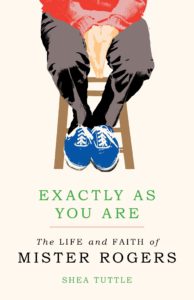 Exactly As You Are: The Life and Faith of Mr. Rogers Shea Tuttle (Eerdmans) $23.99 I know I don’t need to tell you much about the beloved Mr. Rogers. This book has garnered rave reviews from the standard bookish reviewers – The Library Journal gave it a starred review calling it “warmly written.” Publishers Weekly calls it “delightful” and “satisfying” and more. Most importantly, Michael Long, who wrote the must read study Peaceful Neighbor: Discovering the Countercultural Mister Roberts says it is “By far the best book available on America’s beloved neighbor.” It becomes clear for those who have eyes to see it that Ms Tuttle has taken great (as she says in her delightful acknowledgements) encouragement from Mike Long and that she relied on some of his archival research into Fred Rogers’ letters where he often explained the meaning of various episodes. If Long gave us background and context for the Presbyterian clergyman’s television ministry, Tuttle fleshes it out in a full on, serious, wonderfully-written biography.
Exactly As You Are: The Life and Faith of Mr. Rogers Shea Tuttle (Eerdmans) $23.99 I know I don’t need to tell you much about the beloved Mr. Rogers. This book has garnered rave reviews from the standard bookish reviewers – The Library Journal gave it a starred review calling it “warmly written.” Publishers Weekly calls it “delightful” and “satisfying” and more. Most importantly, Michael Long, who wrote the must read study Peaceful Neighbor: Discovering the Countercultural Mister Roberts says it is “By far the best book available on America’s beloved neighbor.” It becomes clear for those who have eyes to see it that Ms Tuttle has taken great (as she says in her delightful acknowledgements) encouragement from Mike Long and that she relied on some of his archival research into Fred Rogers’ letters where he often explained the meaning of various episodes. If Long gave us background and context for the Presbyterian clergyman’s television ministry, Tuttle fleshes it out in a full on, serious, wonderfully-written biography.
Tuttle, by the way, was a perfect woman for this job, or so it seems. She was part of the “Lived Theology” project under Charles Marsh at the University of Virginia and co-edited the multi-year project they developed into the book Can I Get a Witness? Thirteen Peacemakers, Community-Builders, and Agitators for Faith and Justice (Eerdmans; $26.99) which we reviewed appreciatively at BookNotes back last winter. That project, about those who live out their faith in public ways, who take the cost of discipleship seriously as they strive to serve others, certainly gave her eyes to see the work of Mr. Rogers in the light of Christian faith and public reformation. Again, that Fred himself was ordained and active in the Pittsburgh Presbytery, is hugely important. Exactly as You Are is as sweet as it needs to be, making it a lovely gift for anyone who is a fan of Mr. Rogers’ Neighborhood, but it is honest and even profound at times. Just for instance, the section on Fred’s complicated views of the homosexuality of Francois Clemmons who played Officer Clemmons on the show, (not to mention his own sexuality) is nuanced but fraught. As lovely as a book it is (with some nice red ink on the chapter titles) it isn’t fluff or hagiography. It’s very well done.
But, it is inspiring. As it says on the flyleaf,
Tuttle explores this kind, influential, sometimes surprising man: the neighborhood he came from, the neighborhood he built, and the kind of neighbor he, by his example, calls all of us to be.
Reading Exactly As You Are you learn some fun stuff about Fred Rogers. Importantly, you learn how he was guided by “his core belief: that God loves children, and everyone else, exactly as they are.”
A VERY IMPORTANT BOOK ABOUT THE ARTS
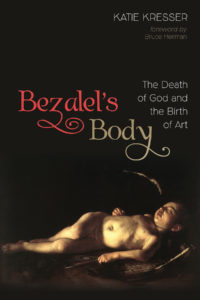 Bezalel’s Body: The Death of God and the Birth of Art Katie Kresser (Cascade) $28.00 I am not positive this deserves a “Best Book of 2019” and I am not finished my work with it yet. But I can assure you that for anyone who has read in the “faith and the arts” movement, who is part of organizations like CIVA (Christians in the Visual Arts), you will find Katie Kresser’s work to be an invaluable encouragement to your own on-going thinking and re-thinking about the very meaning and purpose and value of art. Dr. Kresser is Professor of Art History at Seattle Pacific University. She received her PhD from Harvard. This is a very studious and notable work.
Bezalel’s Body: The Death of God and the Birth of Art Katie Kresser (Cascade) $28.00 I am not positive this deserves a “Best Book of 2019” and I am not finished my work with it yet. But I can assure you that for anyone who has read in the “faith and the arts” movement, who is part of organizations like CIVA (Christians in the Visual Arts), you will find Katie Kresser’s work to be an invaluable encouragement to your own on-going thinking and re-thinking about the very meaning and purpose and value of art. Dr. Kresser is Professor of Art History at Seattle Pacific University. She received her PhD from Harvard. This is a very studious and notable work.
I found the art piece on the cover of this book to be a bit creepy and off-putting. I don’t like the title, either, so I supposed I might have issues with the thesis. So I went into this admittedly with some suspicion. (I always check when reading books about faith and the arts to see if they cite Calvin Seerveld, and if they do not, I am even further discouraged and distrusting.) Alas, I was won over in just a few pages, even by the splendid foreword by the always interesting and always-reliable Bruce Herman. What a good painter, art instructor, writer, (and friend to many) he is! And in his opening comments, I was immediately put at ease about the insight and perspective of this obviously substantive work. Just listen to the first sentence of Bruce’s introduction:
Katie Kresser’s words consistently break open a space for the sustained human gaze – for seeing and responding afresh to the mystery of works of art in all their particularity and stubborn physical presence.
Of course, as Herman makes clear, Dr. Kresser is asking a very old question; namely, “What is Art?” It gets heavy, and within a page (not surprisingly) Herman is citing the last stanza of T.S. Eliot’s Four Quartets (“just before the poet quotes Julian of Norwich…”) and it gets really interesting as he takes us to Catholic theologian and philosopher of aesthetics Han Urs von Balthasar. Finally, he says “The body in Dr. Kresser’s title is therefore also us.” And so it begins.
Bezalel’s Body has lots of full color art included, some that is lovely, some that is a bit disturbing. Some are classics — Caravaggio and Michelangelo and Bosch and Matisse and Picasso. And there are lesser-known old pieces and some contemporary artists that are well worth considering, as she does so well. I so enjoyed these parts when she showed what she was philosophizing about. By so doing is getting us to ask important questions about a faith-infused perspective on art history, art theory, and our own sense of psychology and self and spirituality as we encounter artworks. As it says on the back cover, “By examining how cutting edge art trends reveal age-old spiritual dynamics, Kressler helps recover an ancient tradition with vital relevance for today.” She is trying to help us understand, profoundly, what good art does. I still wish she’d have cited Seerveld…
As I was pondering citing this as a very important book this year, I saw this, which made me realize I was on to something in my naïve skimming of this substantive work. Listen to this:
“In this ranging, evocative book, Katie Kresser reframes the way we approach art. Every encounter with a painting is an encounter with otherness, a reminder of a world beyond myself and of a mystery beyond the world. To stand before a painting or a sculpture is to be called into a relationship, one that aims to change me in the process. After this book, you’ll never walk through a museum in the same way again.” —James K. A. Smith, Professor of Philosophy, Calvin University, Editor-in-Chief of Image Journal
FAVORITE BOOK ABOUT CHRISTIAN FILM STUDIES
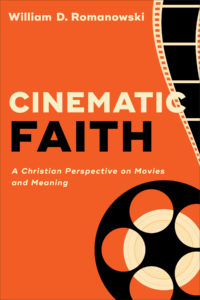 Cinematic Faith: A Christian Perspective on Movies and Meaning William David Romanowski (Baker Academic) $22.99 When I think back of the many long — some too long, I’m told — reviews I did in this past years, one of the ones I’m most proud of was done in mid-June 2016 and it was a pretty major review of a book by an old friend, an esteemed film scholar and professor at Calvin University. I had to mention a ton of other books first, and rumninate a bit on some other titles before, about half-way through that particular BookNotes column, I got around to the major task of explaining this extraordinary book. I don’t want to reprint it all here, but you may want to read it back at BookNotes, HERE.
Cinematic Faith: A Christian Perspective on Movies and Meaning William David Romanowski (Baker Academic) $22.99 When I think back of the many long — some too long, I’m told — reviews I did in this past years, one of the ones I’m most proud of was done in mid-June 2016 and it was a pretty major review of a book by an old friend, an esteemed film scholar and professor at Calvin University. I had to mention a ton of other books first, and rumninate a bit on some other titles before, about half-way through that particular BookNotes column, I got around to the major task of explaining this extraordinary book. I don’t want to reprint it all here, but you may want to read it back at BookNotes, HERE.
Here’s why I am nominating this now, naming it as one of my own favorite books of 2019 and why I think it deserves accolades. As I tried (feebly, perhaps) to say in my earlier review, Bill’s book sets out to do things that few books in the ever-growing genre of faith and film books do; namely, to study film (Christianly, to be sure) as an art work. (Another book I highlighted in the previous BookNotes column has some good work in this exact matter, making it a cut above most. See Deep Focus: Film and Theology in Dialogue by Robert Johnston, Craig Detweiler and Kutter Callaway (Baker Academic; $26.99.)
Study film as a work of art? Of course; there is an art and craft to film making, and just as a critic of paintings or dance or photography or sculpting (or football or cooking or comedy, for that matter) needs to know about the art form itself, the skills and craft of actually making something, making a movie also needs to be firstly understood as a artfully produced artifact by skilled craft people (albeit with unavoidable religious or secular or philosophic values and biases) who make artistic or technical decisions for a reason.
I adore books like Movies Are Prayers by Josh Larsen or Michael Cosper’s fine The Stories We Tell: How TV and Movies Long for and Echo the Truth, both which help film-lovers connect the worldviews of the stories told with the viewer’s deep faith. Fair enough; these are rich resources. And I also like, when I can muster the interest, the fairly heady stuff that talk about the “relationship” of film and theology, as if theologians somehow have to weigh in on the meaning of films.
But Romanowski’s book, if I may say so, seems to suggest that this film plus theology approach is flawed from the beginning, assuming as it does almost a secular vs sacred dichotomy, as if (secular) movies have to be given “meaning” by some religious scholars who can see it, mixing the two discipline of art and theology. I think it’s good for theologians to get involved in all kinds of human stuff, so this isn’t necessarily a bad thing, but one doesn’t create a Christian view of this or that by asking theologians or pastors to add their religious knowledge to the seemingly neutral stuff of the artist. The Christian insight and perspective on this or that — science, art, sports, counseling, economics, or whatever — has to be forged by those who are in that discipline doing that work, not by putting two disciplines (science and theology or film and theology) together, as if those with the vocation to be scientists or film-makers are a-religious until the theologians show up to explain things. This is a difference that makes a difference, I think: it seems that Romanowksi’s project isn’t to add theology to the study of film, but to study film as a Christian who has, in fact, mastered the art of studying film-making.
And so, this brave book, deserves a big award for bucking the trend of merely critiquing the plot and message of a movie, as if the moral of the show is all that matters. With its bright, retro cover, Cinematic Faith is inviting us all to enjoy movies more, as believers, before God, certainly by being attentive to the story and meaning and morals of the film, but more foundationally, by knowing something about how movies are made. What is cinematography and how does it work to create a mood or aesthetic and tone, and how is that mood or aesthetic or tone shaped by the deepest instincts or worldview of the cinematographer? What does the director do? What about editing? How does the acting help tell the story — in fact, why did the casting director choose the stars that he or she did? And on we go, deep into the curious facts and features and finances of the complex art of making a movie, exploring what Romanowski says are film’s “unique capabilities as an audiovisual medium.”
Prof Romanowski’s Cinematic Faith: A Christian Perspective on Movies and Meaning is a lot of fun — I wouldn’t name it one of my year’s favs if it was dry tome, especially since it is about something as entertaining as turning off the lights, heating up the popcorn and spending two hours suspending belief and entering an alternative world. Bill loves the movies (including silly and romantic and dramatic and popular ones.) His faith is deep and it shapes all of his thinking about the arts and aesthetics and entertainment and leisure, so this really is a great read for thoughtful Christians who want to have more pleasure at the cinema. But if we are going to take our discipleship seriously, honoring the Kingship of Christ over all of life, then we have to do some thinking about all this. As I note in my review, “reading enhances our faithful enjoyment.” I commend his book to you.
As I wrote last Spring:
One of the great delights of Cinematic Faith are a handful of (sometimes lengthy) “Movie Musing” sidebars where to illustrate his point in a given chapter, Romanowski explores some detail or theme in popular films.
From the “married life” sequence in Up to looking at “Dramatizing Drone Warfare in Eye in the Sky” to a brilliant analysis of history in the movie Lincoln to a fun interpretation of “time loop fiction” by way of a study of (what else?) Groundhog Day to one called “Boy Meets Girl in La La Land” these are all fascinating (even if you haven’t seen the film under consideration.)
Bill has spent considerable scholarly energy studying melodrama (and, for example, Titanic) and he loves Rocky (which, in a “Movie Musing” he calls “A Classical Hollywood Film.”) He offers musings on Blade Runner and The Imitation Game as metaphors, “art and ethics” in Rear Window, and a great piece called “Narrative, Character and Perspective in The Blind Side” – you’ve got to read that if you enjoyed this movie as much as we have. Through all of these excursions, you can tell that his tastes are not overly high-brow. (Remember his central thesis of Pop Culture Wars that all film and pop artifacts are religiously/philosophically laden and artfully serious, and his central thesis of Eyes Wide Open that we can find signs of life and Godly insight from even pagan popular culture.) Cinematic Faith is hoping to enhance your viewing experiences and help you get more out of your entertainment dollar, not bore you with academic discourse or shame you for enjoying the movies you enjoy. Please know, this isn’t highbrow scholarly theory for snooty cineastes but a thoughtful tool for all of us, whether you like The Kings Speech or the X-Men series or Marvel’s Captain America: Civil War.
Regardless of what kind of movies or Netflix shows you enjoy, you should learn a bit about the art of interpretation. This is a major theme of the book and I think it explains some important critical insights without being all alarmist (the secular bad guys are out to get you) or with too much professional film-critic jargon. He offers up-to-date insights about interpration and he roots in in four guiding Biblical principles. It has a chapter called “Movie Making Magic” and another that is pivotal, exploring the relationship of “form and content.” Oh yes, that. You knew that was coming, didn’t you?
As I wrote before, in lines I’m sort of proud of:
There’s plenty more in Cinematic Faith, from a strong reminder that the routine vision of American individualistic self salvation in many films is a far cry from the core tenant of being save by God’s grace, to a unique study of The Blind Side, to a wonderful epilogue that draws on Shrek. For those with eyes to see, all films can and do express meaning and “communicate life perspectives.” They can help us see and they can help us care.
Can knowing a bit about how they are made and how they work on us and how to critically engage them help us discern those that “resonate with a biblical outlook and so deepen our awareness of the ways that humans bear God’s image and flourish through acts of love, forgiveness, and generosity?” This book insists yes. We can truly enjoy movies and be challenged and grow through their artful style – especially if we know something about it all.
Cinematic Faith: A Christian Perspective on Movies and Meaning stands out as a large gift to anyone that who enjoys movies and film and certainly anyone who is attempt to be intentionally faithful in “finding God in popular culture.”
SPECTACULAR PHILOSPHY, HISTORY & THEOLOGY in ONE BIG AWARD-WORTHY VOLUME
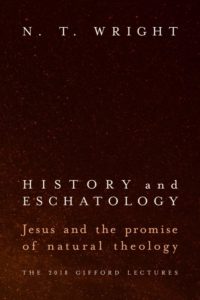 History and Eschatology: Jesus and the Promise of Natural Theology N.T. Wright (Baylor University Press) $34.95 [no discount on this time, sorry.] This may be the most scholarly book yet done by N.T. Wright and certainly he is in exquisitely academic company in being asked to do the famous, prestigious Gifford Lectures. This book offers us all a chance to take in those lectures; in a clever personal note at the beginning (which I shared the last time I wrote about this at BookNotes, I believe) he explained the significance of this lectureship and what he hoped to accomplish in them. “My goodness,” his mother said, “I’m glad I didn’t have to listen to those lectures.” He good-naturedly invites his readers to abandon the book henceforth if they find it a bit obscure. I get that.
History and Eschatology: Jesus and the Promise of Natural Theology N.T. Wright (Baylor University Press) $34.95 [no discount on this time, sorry.] This may be the most scholarly book yet done by N.T. Wright and certainly he is in exquisitely academic company in being asked to do the famous, prestigious Gifford Lectures. This book offers us all a chance to take in those lectures; in a clever personal note at the beginning (which I shared the last time I wrote about this at BookNotes, I believe) he explained the significance of this lectureship and what he hoped to accomplish in them. “My goodness,” his mother said, “I’m glad I didn’t have to listen to those lectures.” He good-naturedly invites his readers to abandon the book henceforth if they find it a bit obscure. I get that.
From the Gifford Lectures website, I copied this:
The prestigious Gifford Lectureships were established by Adam Lord Gifford (1820–1887), a senator of the College of Justice in Scotland. The purpose of Lord Gifford’s bequest to the universities of Edinburgh, Glasgow, St. Andrews and Aberdeen was to sponsor lectures to “promote and diffuse the study of Natural Theology in the widest sense of the term—in other words, the knowledge of God”.
Since the first lecture in 1888, Gifford Lecturers have been recognized as pre-eminent thinkers in their respective fields. Among the many gifted lecturers are Hannah Arendt, Noam Chomsky, Stanley Hauerwas, William James, Jean-Luc Marion, Iris Murdoch, Roger Scruton, Eleonore Stump, Charles Taylor, Alfred North Whitehead, and Rowan Williams.
It has been rare to have a Biblical scholar deliver these lectures (I’m told this is the first time in many decades, and certainly the first evangelical Bible scholar.) So this is a very big deal, with the publication of the volume obviously needing to be named as one of the most important books of 2019.
Here are two of the many rave reviews about this dense text:
This is Tom Wright at his best–an exegete, theologian, churchman, and public intellectual rolled into one. A creative and arresting contribution to ‘natural theology,’ this book argues for the plausibility of the Christian vision of the relation between God and the world by taking seriously the history of Jesus Christ, especially the promise contained in his resurrection of the new creation: the creation become God’s and humans’ home.
With a stunning breadth of research Wright takes his Gifford lectures as an occasion to deepen the paradigmatic shift in biblical studies that he has shaped over the last thirty years. Wright offers a model of historical exegesis that just might release us from our Platonic bondage. This book combines breathtakingly creative brilliance with a lovely eloquence. Since an ‘epistemology of love’ is at the heart of Wright’s natural theology, we wouldn’t have expected anything less. Read this book, then read it again. It takes its place in the esteemed tradition of Gifford lectures becoming classics.
THEOLOGY FOR THE REST OF US
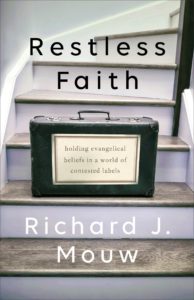 Restless Faith Holding Evangelical Beliefs in a World of Contested Labels Richard Mouw (Brazos) $19.99 This was a year of some very important theological works and some were even fairly widely known and/or discussed. Think of the writer with an unparalleled vocabulary, the too-feisty Hart who wrote on Yale University Press the important That All May be Saved or
Restless Faith Holding Evangelical Beliefs in a World of Contested Labels Richard Mouw (Brazos) $19.99 This was a year of some very important theological works and some were even fairly widely known and/or discussed. Think of the writer with an unparalleled vocabulary, the too-feisty Hart who wrote on Yale University Press the important That All May be Saved or
But Dr. Mouw is absolutely my favorite theologian and this is his reasonable, chatty, conversation about what it means to be an evangelical, how he, as an ecumenically-sensitive, Reformed thinker, uses that word to describe himself (even though he’s never been fully comfortable with the association) and why he thinks it is still worth holding on to.
Look: if you want to know what, really, this phrase means, without wading through the brand new (quite definitive) collection of essays called Evangelical this grand little book written almost as a memoir (almost a follow up to his memoir called Adventures in Evangelical Civility) Restless Faith is hard to beat. I am amazed how Mouw can take a story or episode or a book, calmly tell you something about it, use it as a springboard for another idea which he counters with a critique of that idea, smoothly helping us understand several viewpoints on a topic and why he favors this or that nuanced formulations. It is just wonderful being guided by him towards better thinking and a true joy of learning.
If you want to learn a lot about a lot of various theological themes and questions, Restless Faith is a way to get up to speed, painlessly. He’s a clear-headed and calm writer, interesting and fair and reliable. Until is amazing book on common grace comes out from Brazos Press next May (All That God Cares about: Common Grace and Divine Delight) read Restless Faith and then read it again. Very highly recommended.
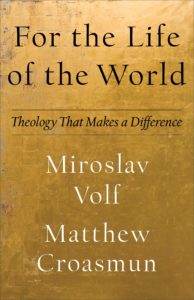 For the Life of the World: Theology That Makes a Difference Miroslav Volf & Matthew Croasmun (Brazos Press) $21.99 Not all of us can wade through heady, abstract theology, and this book deserves our accolades here at year’s end because it was a book that, in fact, tried to address that. Not that they suggest all academic theology should just be less scholarly. No, they are asking a more fundamental question, it seems: what is the point of theology if it does not make a difference in help us, as individuals, churches, and society at large, more full of God’s shalom? That is, does it make us flourish? There are bold and some may protest, but they are asking if theology can actually address the actual question of what makes for human happiness. If some research on this has been done (and it has) then how can theology help us construe and live a life of meaning? Wow.
For the Life of the World: Theology That Makes a Difference Miroslav Volf & Matthew Croasmun (Brazos Press) $21.99 Not all of us can wade through heady, abstract theology, and this book deserves our accolades here at year’s end because it was a book that, in fact, tried to address that. Not that they suggest all academic theology should just be less scholarly. No, they are asking a more fundamental question, it seems: what is the point of theology if it does not make a difference in help us, as individuals, churches, and society at large, more full of God’s shalom? That is, does it make us flourish? There are bold and some may protest, but they are asking if theology can actually address the actual question of what makes for human happiness. If some research on this has been done (and it has) then how can theology help us construe and live a life of meaning? Wow.
Here is what I wrote about it when I was inviting BookNotes readers to send us pre-orders. It came out, then, in late January 2019; we had the great joy of being with Volf again earlier this year (at Church of the Good Samaritan at an event hosted there for the Episcopalian Diocese of Pennsylvania. What fun!)
I hope you noticed my little shout out about this, ever so briefly, in the previous BookNotes newsletter. I was reviewing a book by and about the life of singer-songwriter and justice advocate and global peacemaker, recording artist and Anglican priest, Garth Hewett. I said something about his art and his theology intertwining somehow, and that he sang about stuff that mattered and that there have been recent books about an evangelical vision for the common good that explore the same sorts of themes that Hewett sings and writes about. Theology, good theology, like healthy spirituality, must always bear fruit deepening our love for the world God so loves and equip us to be faithful in our engagement with our times. Professor Volf knows this and is an acclaimed “public theologian” whose books have this keen perception of the issues of the day and whose study yields deeper insights about being alive in and for the world.
This work is asking a huge question, and that is, if it doesn’t sound too grand, “what makes life worth living?” In fact, Volf is involved in the significant Yale Center for Faith and Culture where his co-author, Matthew Croasmun, directs the Life Worth Living program. They are doing research into this fundamental, human question and then — yes! — asking how to do theology in light of that, or in conversation with that human research. In a way, this must be a major concern of any theology that hopes to get a hearing in our pluralistic, pluralizing, post-Christian (post secular?) world. The question of what constitutes a flourishing life is up for grabs (or is just as often just neglected in our universities, business’s, and even churches!)
The vision for theology presented here is simple but not easy. Volf and Croasmun think our task as theologians is to be about the flourishing not only of the academy or the church but also of all peoples. Their work is tested in the hard laboratory of professors’ classrooms and church planters’ living rooms. I challenge you to read this book and not come away encouraged, enlightened, and renewed for our task of contemplating God for the good of humanity. So much of what passes for theology dies in intramural food fights and name-calling. This book calls us to a task more urgent, more dangerous, and more life-giving by far than that.
— Jason Byassee, Vancouver School of Theology
NOTABLE THEOLOGY: ONE I’M TOLD IS ESSENTIAL AND BRILLIANT
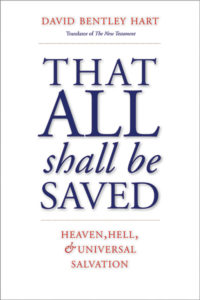 That All Shall Be Saved: Heaven, Hell, & Universal Salvation David Bentley Hart (Yale University Press) $26.00 I didn’t read this. Okay, so sue me – I’m naming it, anyway. There is little doubt in my mind that there is no other theological books that was published this year that got as much scholarly attention, was as seriously reviewed, as hotly debated and became a big seller as this obtuse and heavy volume published by one of the most intellectually hefty writers of our time.
That All Shall Be Saved: Heaven, Hell, & Universal Salvation David Bentley Hart (Yale University Press) $26.00 I didn’t read this. Okay, so sue me – I’m naming it, anyway. There is little doubt in my mind that there is no other theological books that was published this year that got as much scholarly attention, was as seriously reviewed, as hotly debated and became a big seller as this obtuse and heavy volume published by one of the most intellectually hefty writers of our time.
Hart is known for using too many big words, for seeming ostentatious, and for clearly being a pugilist when it comes to argument. I do not want to say he is uncivil, although calling him snarky sounds too soft and popular and fun. He’s forceful and arrogant. He’s blunt and (did I say) obtuse. He’s a writer many love to hate, or, as I sometimes say, hate to love. He is Eastern Orthodox, says he is a democratic socialist, and has been described by conservative writer Matthew Walther as “our greatest living essayist.” His deep first book (The Beauty of the Infinite: The Aesthetics of Christian Truth) was published to extraordinary acclaim; he has published other fine books with Eerdmans and other important religious publishers, and is a contributing editor of First Things. Paul Griffiths says (on the back cover of That All…) “David Bentley Hart is the most eminent living Anglophone theologian.”
John Behr of St. Vladimir’s Orthodox Theological Seminary says, of That All Shall Be Saved,
At last! A brilliant treatment – exegetically, theologically, and philosophically – of the promise that, in the end, all will indeed be saved, and exposing the inadequacy – above all moral – of claims to the contrary.
So many others have said these sorts of things – from popular writers like Rob Bell (do you recall my five part study of that book at BookNotes, writing more words about it than the book itself?) or Philip Gulley on one hand to heavyweight scholars like Moltmann, Barth, James Allison, or Robin Parry, on the other, while evangelical professors like Sharon Baker have books with titles like Razing Hell and Brad Jersak and Keith Giles and Brian Zahnd popularize these conversations afresh. Everybody brings in George MacDonald and how C.S. Lewis approached these things. My point is that even this year we’ve stocked a good number of books that explore this. Why did Hart take the cake?
I suppose it may be because, as Behr opines, it is brilliant, and covers Scripture, theology and philosophy. As John Milbank (!) writes on the back, “He calls us back to real orthodoxy, perhaps just in time.” I’m not sure what that means, but: Milbank! One reviewer says Harts argument is “gorgeously elaborated with unmatched force and brio.”
So, it’s being talked about in high-falutin’ circles and although that’s not fully our crowd, I respect scholars like Simon Oliver (of Durham) who says it is “some of the most exacting, perspicuous, and powerful theological writing I have read in recent years.” And ya have to love a book that is said to be written with “unmatched force and brio” which is sort of the same thing, although I can imagine that it is unmatched.
Okay, it deserves to be on our notable list. I suppose I should wade in. I’ve read a number of complex reviews and maybe you have too. Now, here’s your chance to buy the book, at our 20% off discount. Let us know what you think.
++++
PLEASE TUNE IN IN A DAY OR SO TO CATCH THE GINORMOUS PART TWO OF MY BEST BOOKS OF 2019 LIST.
We hope you subscribe to our free BookNotes email, which you can easily do by entering your email address in the little subscription box at our website) PART TWO will have some really good ones in some fascinating categories, some fun and edifying and perhaps surprising suggestions, I promise. (Including the book I was most conflicted about, in the perennially favorite “Best Book I Hated To Love” category.) Spread the word!
BookNotes

SPECIAL
DISCOUNT
20% OFF
ANY BOOK MENTIONED
+++
order here
this takes you to the secure Hearts & Minds order form page
just tell us what you want
inquire here
if you have questions or need more information
just ask us what you want to know
Hearts & Minds 234 East Main Street Dallastown PA 17313
read@heartsandmindsbooks.com
717-246-3333
